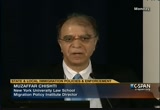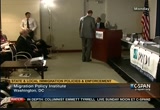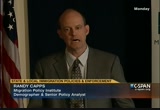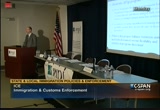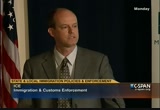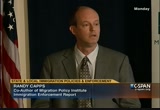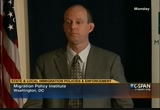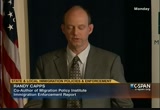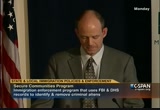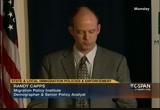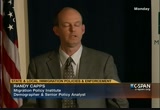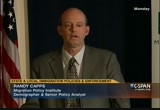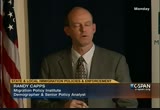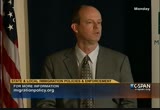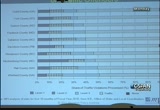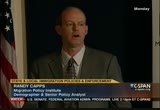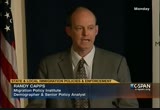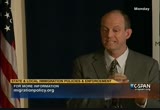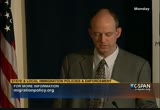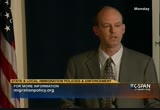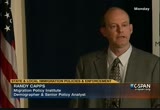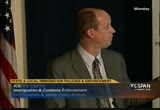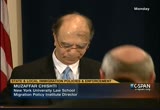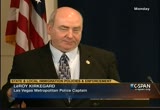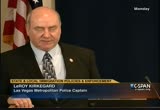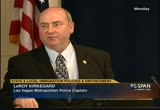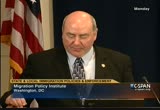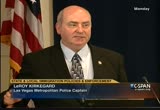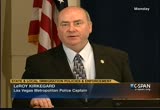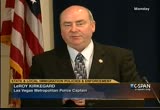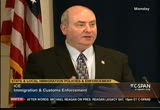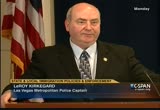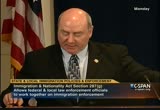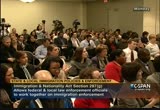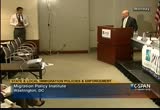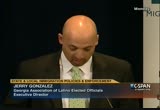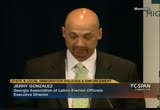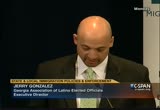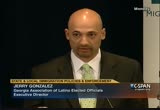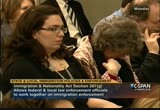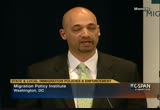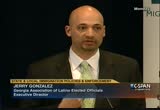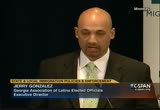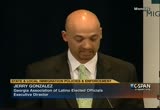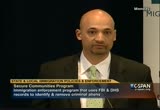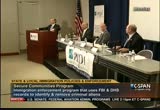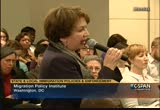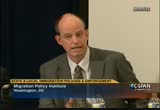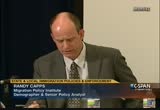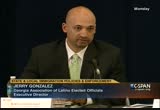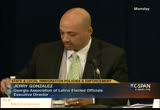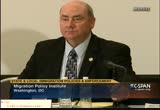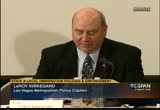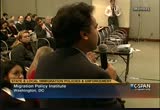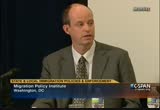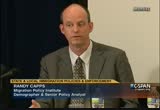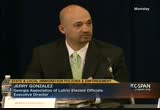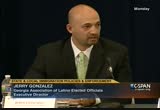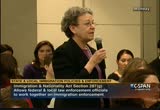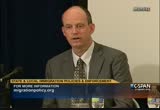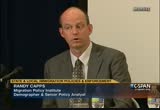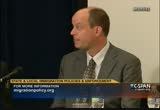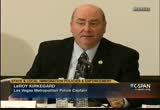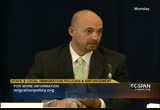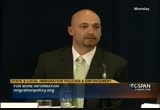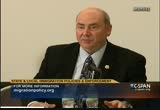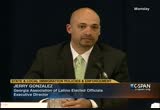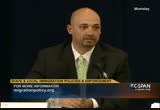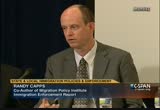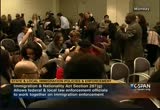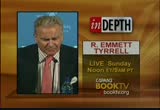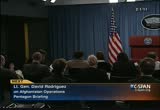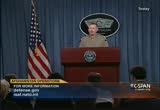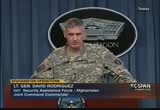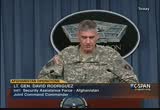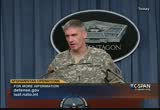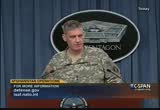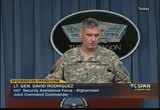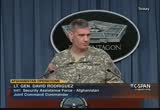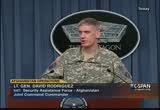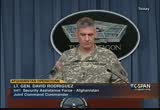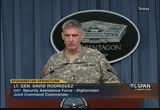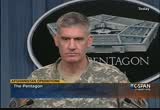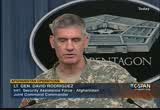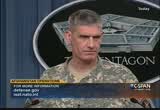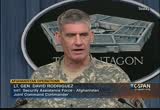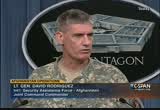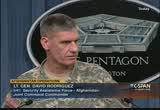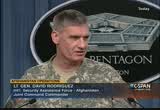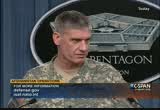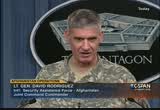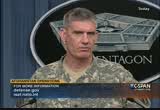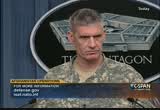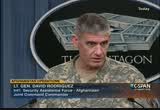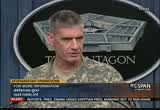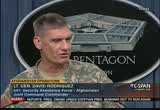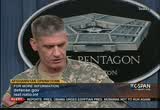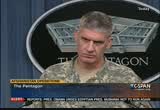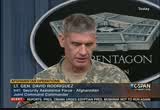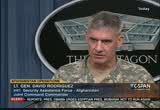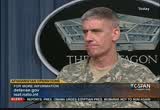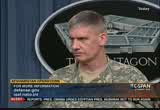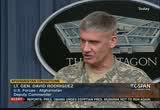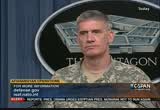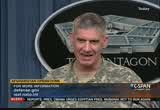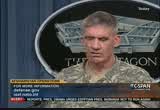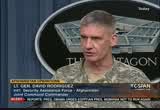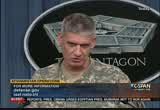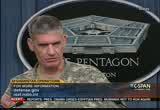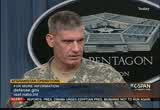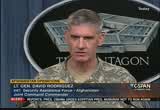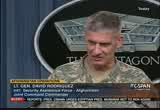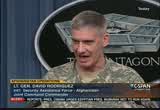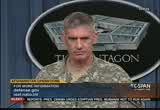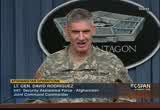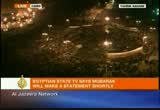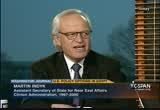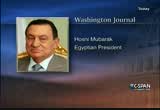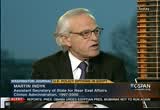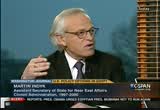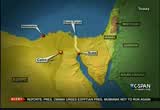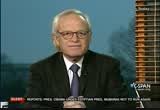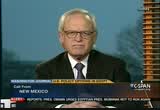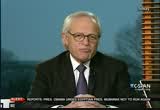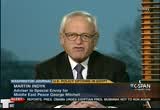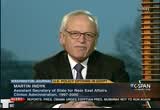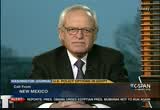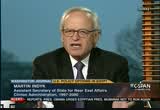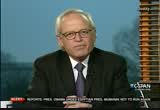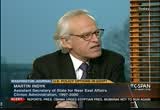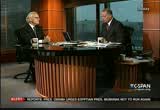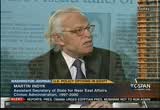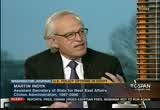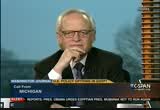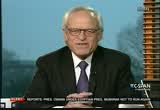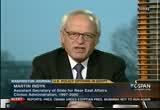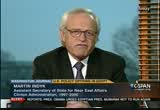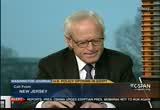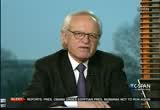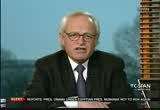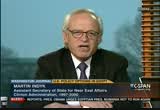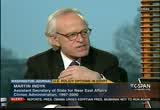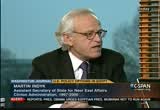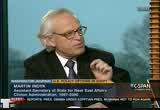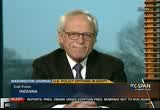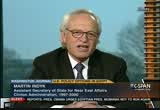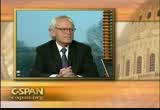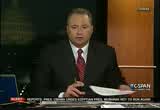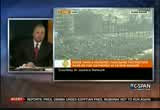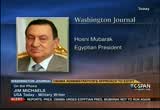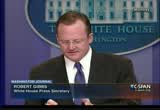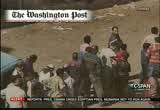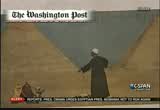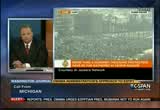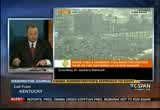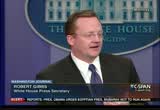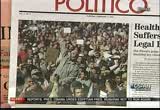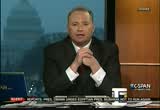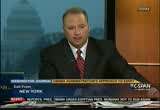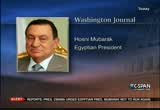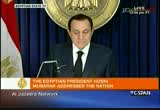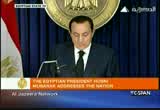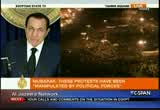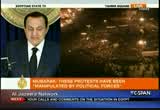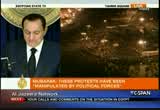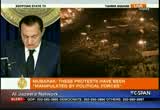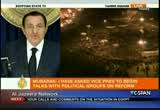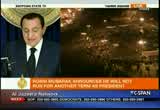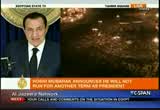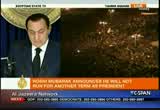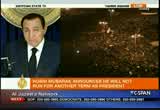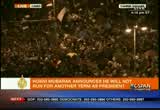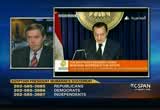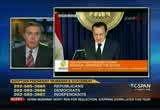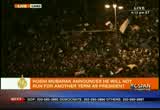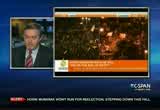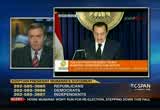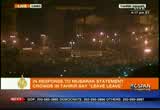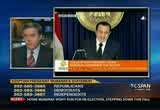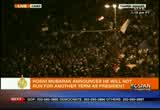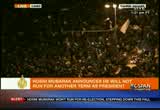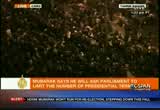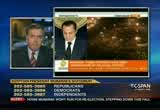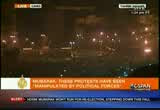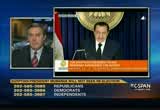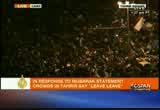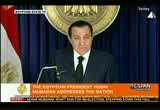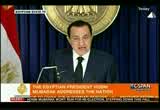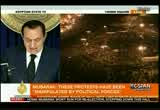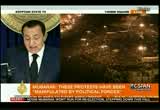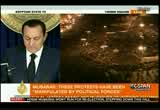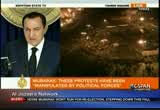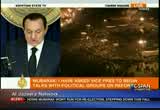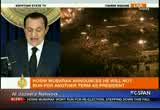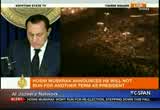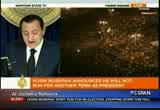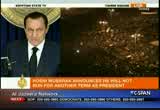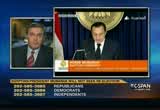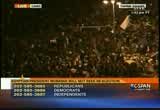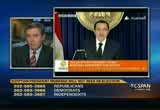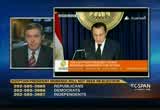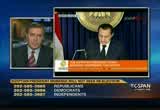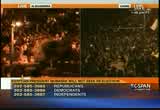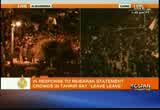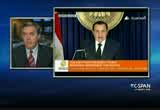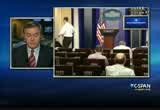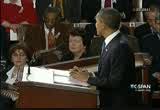tv U.S. House of Representatives CSPAN February 1, 2011 1:00pm-5:00pm EST
1:00 pm
we met close two hundred community leaders from civil liberties lawyers and people run to domestic violence programs and school teachers and others in these districts. it took us these few months to write the report. this is the product of the journey. there are four co-authors and we're all here today. let me introduce two of our mark rosenberg ayt npi. he asks us to look at the big picture of my co-conspirator at nyu law school, cristina
1:01 pm
rodriguez who is now on leave from npi is also a senior fellow at npi. , randy. he is not only the senior policy analyst but he made sure that we had our methodology straight about this project and made sense of the numbers. randy capps. >> thank you for that kind introduction and thanks everyone for coming today. these of the central questions that we address in the report. first of all, what are the outcomes of the 287-deprogram in terms of the type of people who are detained? we rely primarily on the data that ice provided to us that tell us about the types of criminal offenses that people
1:02 pm
perform big four going into the 287-g program. secondly, what are the goals and motivations for the program nationally and locally? those are espoused by ice and the obama administration and those that have been publicly stated by participating state and local levels of government. third, how is the -- how has the program implemented originally or sense the 2009 program revisions by the obama administration? how strong is program oversight and supervision? the u.s. and general government accountability office and dhs office of inspector general have been highly critical in recent reports and we want to see how this was working in practice in our 7-study sites. are the costs, benefits, and community benefits?
1:03 pm
these are difficult to quantify we do provide the qualitative evidence around these impacts as well as an affirmation more quantitated. finally, we make recommendations for improving the program. there are basically two major framing issues around our findings that i would like you to keep in mind during this presentation. the first of these is on the level of targeting. this has changed somewhat over the course of the program's history. ship date 287-g program focus on people that the government has identified as top priorities? they have committed serious crimes, you might call them dangerous or violent criminals or who have prior deportation orders or multiple immigration violations. and the other hand, should the program removed as monday on authorized immigrants as possible even if they do not fit one of these publicly-stated
1:04 pm
federal priorities? the second big question is, like any program that involves federal partnership with state and local government, what is the proper balance between uniformity and federal control of the program purses' the flexibility and state and local program direction? a second important thing to understand is how ice has classified the people going for the program in terms of their criminal offenses. this is taken from the 2009 standard agreement that all the programs are renegotiated last year. level one zero fences are your major drug offenses or violent offenses like murder, manslaughtermurderetc, and level two defenses are property offenses. last summer, i.c.e. equate level one and level two as felonies.
1:05 pm
: and set -- level two or your serious crimes. level three offenses are misdemeanors and sometimes include only civil offenses. finally, traffic offenses -- this is at the bottom of the slide -- traffic offenses are not coded as level one, too, or three. they are in a separate category. the mostly involve driving under the influence or driving without license although they do sometimes include more serious offenses. what is the 287-g program in its current form? there is the gl model, the task force small, and the hybrid which involves both kinds of operations in the same jurisdiction. in the jail model, the officers to receive about one month's training at the same academy as the i.c.e. officers do have the
1:06 pm
authority to ask people where they were born, when they commit to the country, how they can enter the country, what their jobs are, etc. in order to ascertain their legal status. they have the authority if they believe they are on authorized or are legal immigrants who have committed a crime that warrant removal to place holds on these individuals for up to 48 hours before i.c.e. can transfer them into federal custody. they also have the authority to generate removal charges, to read at the formal documents that place these immigrants in proceedings for removal before immigration judges. they do all of this when immigrants are booked into jail. that is at the beginning of their booking and often before conviction. the arresting officers in the jail model usually don't work for the same agency as 287-g officers. they usually work for a county
1:07 pm
sheriff that operates the jail and the arresting officer is work for a county or local police department often with a separate chain of command. the arresting officers in the gl model generally do not have federal training or authority to inquire about immigration status. in the task force model, the 287-g officers are the arresting officers and perform a screening in that field. they can place the detainers in the field before immigrants are brought to jail. they often do their operations to live with federal agencies, such as ice, dea and the fbi. they are supposed to get prior approval for any immigration charge-related arrests. these arresting officers generally have training from the federal government in immigration law and procedures as opposed doing those arresting procedures in the gel
1:08 pm
model. we have a mix of these three types. frederick county nearby in maryland is a hybrid model. prince william county in virginia actually has four different jurisdictions. the two largest include a jail model and a task force model. cobb and gwinett counties are among the four largest as far as volume and colorado has a statewide task force that focuses on immigrant smuggling along the state's major highways. how targeted is the 287-g program? there are diversions and classified the programs generally to the debt that our study cites as universal or targeted programs. the universal programs are those
1:09 pm
that screen and place detainers on virtually everyone in jail for a test for setting for it all the on authorized immigrants -- on authorized -- un authorized immigrants get proceedings regardless of how serious their crime was. the targeted programs by contract focus primarily on those with more serious violations. they adhere closely to what we saw in the 2009 revisions, focusing primarily on level one and level two. and less often placing detainers on level three and traffic offenders. in reality, there are variations with some programs more targeted than others. if you look in the appendix at the end of the report, there's quite a variety among the 70 odd programs nationally. as far as the second major question about state and local
1:10 pm
versus federal control, we found, in contrast to some previous reviews of the program, very close supervision by i.c.e. agents. there is a daily presence in the jail settings and frequent communication with task forces. we also found that the local i.c.e. officers that they are involved in the program tend to support localities. this is to show you the variation from the types of offenses by the seven-the study cites and this is the central piece of quantitative data in the report. if you look at the top bar which is all the jurisdictions, you can see it as half and half. the darker green is level one. the diamond pattern is level 12. the lighter green as level 3.
1:11 pm
the hash marks are the traffic offenders. you can see it is about half level one and level two and the other half level freeze and traffic offenders. you see the variation among our programs. colorado is unique. i believe it is purple up there. if people have no criminal offenses and colorado and the reason why they are unique is because these are people who were arrested during a busted smuggling operation and are often recently caught crossing the border. they have not been in the country long enough to permit, a criminal offense. -- to commit a criminal offense. 80% or so are level 3 offenses and only 20% are serious offenses. prince william county, gwinnett
1:12 pm
county, and the prince william county jail, and the middle and are very close to the national picture. glen beck county was only a few months into its program and we work -- the gwinnett county was only a few months into its program and it looks like cobb. several hundred people in quebec county have been referred to ice for removal because they were driving without a license. you can see that in las vegas nearly 3/4 of all the the tenors are placed on people with level one or two offenses. we also looked at how this varied between task forces and jail models across the spectrum. this was the surprise finding support me. gaols account for 90% of all the program activities in terms of
1:13 pm
the number of detainers. the hybrids that to both account for 8% and most of these detectors are placed in a jail setting. a pure taskforce only accounts for about 2%. this is largely a jail-based program even though the task forces have receive scrutiny and public controversy. jails are no more targeted and task forces. in both cases, about half of the tenors are placed on level one and level two. colorado is the exception. they focus on the smuggling passengers. if you take colorado out of the data and look at all the other task force agreement, they also have about half level one and two and half on traffic offenders. another thing we looked at overall is patterns in terms of which type of programs are more likely to be targeted. as it turns out, the top 12 in
1:14 pm
terms of traffic offenders are located in the south east in the states of georgia, north carolina, south carolina, and tennessee and also frederick county, maryland. in all 12 of these, half or more of the detainers are placed on people with traffic violations. mecklenburg, county, n.c. was one of the first ones to operate the universal jail model. we believe most of these programs were patterned after a mecklenburg. we looked at community impact. one thing we looked at was patterns of population change. we looked at the american community survey data for 2009 and compared it to the year before the program was implemented, we found the hispanic non-citizen population falling and increasing in neighboring counties. locally, that meant a 60%
1:15 pm
decline in frederick county. and there was a slight rise in montgomery county. in prince william county, there is a significant population decline of around 1/4 and a bond in neighboring fairfax county. most democrats stayed put they avoid public places -- most emigrants stayed put and they avoid public places. prince william, frederick, when that end, county which are suburbs of georgia are large suburban areas with very limited public transportation networks. people essentially still needed to drive to get to work and needed to drive to take their children to school or school meetings. for these essential activities, they continued driving but they curtailed their driving and other types of activities and were less likely to participate in parental activities in the
1:16 pm
school and less likely to patronize local businesses. they expressed fear and mistrust of the police. we heard about racial profiling. this has been talked about in other reports. this is very difficult to prove and did not attempt to do so. however, there is plenty of evidence that the fear and mistrust of police has change behavior is a potentially major committees or less say. there has been great public controversy. the sites where this was widespread are universal jurisdictions and in particular, and quebec county and frederick county, maryland. people are most afraid of being arrested while they are driving. these places often have stayed immobile laws and ordinances that target immigrants. the most effective among our study cites is the georgia state
1:17 pm
law that requires somebody to be taken to jail if they are caught driving without a license and imposes a felony on the fourth time. this enables the police to bring in a large number of people for screening and removal. these types of community impacts were less common in our more targeted jurisdictions in the middle. in colorado, is a statewide program. the operations are not concentrated you don't see neighborhood-specific impact. prince william county has evolved its program to a more targeted fashion for in prince william county had an ordinance on the books similar to the arizona law which would have authorized police to stop and question people about their legal status of the backtrack on that law. they have done a lot of community outreach. that has dialed back the
1:18 pm
controversy in prince william significantly. these are the least significant in our largest sites. the programs are most targeted in los angeles. they are not making as much of an impact. in conclusion, we find that ice tolerates a high degree of ambiguity across to a two -- 287-g jurisdiction. ice just publicized at a cost an average of $12.5000 to detain and remove some from the country. it varies from case to case. if you talk about 60,000-odd part d tenors placed on people half of which are for less serious offenses, we're talking about tens of millions of dollars spent every year in detaining and removing these
1:19 pm
people. the targeted programs have lower-cost because they will yield smaller numbers and a better fit enforcement priorities. universal enforcement is not limited to task forces. the jails have an additional accountability problem that the arresting officers don't work for the central park and and are not overseeing and supervisor byi.c.e. the secure communities program involves a fingerprints taken in the jail and information from the fingerprints is set up to the dead adata base. that's secure community program is almost in 1000 jurisdictions and will be nationwide. because it is a universal screening program, they face some of the same difficulties we see with 287-g.
1:20 pm
ice should implement a targeted program focusing primarily on level one and level two offenders and multiple immigration of vendors. they should follow a las vegas model. we also recommend that the tenors be placed after conviction as they do in los angeles. -- detainers be placed after conviction as they do in los angeles. we recommend a discontinued the universe of jurisdictions and weigh the cost and benefit of the program verses the secure community and other partnerships. if ice decides to keep the program, it only expanded jurisdictions that do not have
1:21 pm
racial profiling. ice itself along with a partner agencies should conduct more outrage. some jurisdictions including las vegas and prince william county are already doing this. "this should involve a advisory committees. as well as public statements about the purpose of the program. with that, you can see at the bottom of this slide our phone number and web page. >> thank you, randy. let me ask capt leroy kierkegaard to speak. he was involved in the inception
1:22 pm
of the program and he has the supervision on a daily basis of the program since it started. christianne and i were guests of the jail for about one day. the cause consternation in our families, but we were well received. i learned that capt. kierkegaard is also called capt. k all over las vegas and this is his first visit to washington, d.c. welcome to the nation's capital. >> thank you and good morning everybody. i am very excited to be here. i am an operational level capt. in las vegas. our sheriff was an idol to attend because of other commitments. -- was unable to attend because of other commitments here i am.
1:23 pm
i would like to thank the migration policy institute for coming to las vegas and taking a look at our program. secondly, the invitation here today, i appreciate that. this gives me an opportunity to share our program with everybody. we're proud of what we have done in las vegas. immigration policy has become a major focus of the last few years. i am not here to represent any political viewpoint. i am an operational person. i think the study has done a great job. it offers solutions to some of the challenges in immigration policy. it opens the door to further discussion and understanding. it opens discussion to transparency.
1:24 pm
back in january of 2007, the sheriff took his oath of office as the first sheriff of park county and the leader of the las vegas metropolitan police department. we inc. about 37 years ago so we do not have a clark county sheriff's department. where i work falls under cherub gillespie. the first thing that he did was sat down with his executive staff. i was part of that back in 2007. wycombe up with a vision statement in las vegas. sheriff gillespie and staff decided we want to make las vegas the safest community in america. with that vision statement, we started our strategic planning. in april of 2007, 287-g program came up.
1:25 pm
we wanted to use that to help reach our lofty aspirations. it was not an easy decision. we did a lot of research and made many phone calls. we did site visits for four or five months before we signed the initial application. when a lot of phone call toi9.c.e. i.c.e. our formal application was done in august, 2007 ^ we signed our first moa in 2008 and we began later that year. i will not discuss our numbers today. everybody here and mpi passed to speak about why we are successful. we did our homework.
1:26 pm
in april of 2007 into 2008, we talked to the current agencies and people got tired of those calling bam and going to visit them. we visited agencies in california, arizona, and looked at many agencies. we were fortunate because we built our program on their successes and challenges. we took that into account when we were putting together our program in las vegas. our selection criteria was very important for our officers. once we decided we were going to put in the application for 287- g, we went around to each platoon. we went to every shift and explained the program. we saw the input and got
1:27 pm
volunteers. once the people volunteers, they went through the interview process. we did background checks and checked the personnel file. 24 people put in pork and a selected 10 people. these 10 officers are still working in the program today. they helped develop this program along with localized offices from the ground up which greeted ownership in this program and created a voice for us out in the community. these guys had to go out and meet community leaders. relationship building and constant communication with i.c.e. personnel is continuing today. we are fortunate in last vegas the cause thei.c.e. office is just down the street.
1:28 pm
we have regular meetings between their supervisors and a lieutenant that oversees over the program. they meet regularly. i have monthly meetings with i.c.e. and the r.o. staff. the meetings are informative. we sit down and talk about challenges and concerns and wait to do things better. -- and ways to do things better. program transparency is something that share of gillespie has talked about when he took office. he continues to talk about it today. we are very transparent with everything we do in the las
1:29 pm
vegas metropolitan police department. we have several media context prior to implementation. in november of 2008 we saw it -- we had a press conference and announce our plan. we opened up our doors to the media. we used print, media, tv, everybody can come into the jail and take a look at the program an interview the officers. if the people will have been arrested are willing to do it, bacon interview those people, too. -- they can interview those people, too. we make sure all the patrol function in las vegas was briefed on what we were doing. it is very clear to the entire agency and the community that what we were doing was going to target those people that were charged with a violent offense and were not going to arrest people out on the street.
1:30 pm
by explaining that program to the patrol officers and special teams that work every day, that started to help alleviate the concerns and fears that the community at. that went along way to the success of the program. the other thing we do as far as transparency, we do special town hall meeting. s. we have our first tuesday at the area command or the community is invited and we can talk about the program. we do presentations at the hispanic citizen committee. from an operational standpoint, we do a much plea287-g statistical report -- we do a monthly 287-g statistical
1:31 pm
report. our direction continues to be removal of violent offenders from the communities of last vegas. and to designate, we established a priority system based on criminal charges. when we signed moa in july of 2009, that was not a big change. we were already doing the level one, level two, and level three offenders. we want to target the serious offenders being brought into the jail. las vegas metropolitan police department does not arrest subject based on immigration status. they are arrested on the street or they might have a bench warrant.
1:32 pm
once that person walks in the door based on his status as a foreign-born, if they admit to it, that is what starts the process for us. our designated officers take a look at them and question them and to in-depth questions with them. they determine whether or not these people -- if they will start proceedings. one of the things that i want to impress is the relationship with i.c.e. and we have a great group of people working with them. this is the sheriff's program and we are doing it with the assistance i.c.e. and e.r.o. we have a successful program. this excess is the result of
1:33 pm
very specific objectives. -- the success is the result of very specific objectives. there are no hidden agendas with the public or community. we are available to answer questions and address concerns. we have always had a productive relationship with a ouri.c.e. program, thank you. [applause] >> our last panelist is carried gonzales, the executive director of the georgia latino association. jerry is one of the most keen observers of the 287-g program in the metropolitan atlanta area which covers more than one program. he has observed its impact for a
1:34 pm
long time and is also -- has also seen the state legislat ure action. >> good morning. my name is jerry gonzalez, executive director of the georgia association of latino elected officialsgaleo was founded to enhance an increase of a engagement of the latino community across the great state of georgia. under civic engagement, our primary focus regarding policy has been the lack of a cohesive federal immigration policy. we have also been working diligently against any attempt to regulate, enforce federal immigration laws at the local or
1:35 pm
state level. georgia is the second worst state in the country when it comes to creating a hostile environment for latinos or immigrants. it is second only to arizona. let me give you context -- in 2006, the georgia legislature passed anti-democrat legislation targeting immigrants, not employers. it attempted to create attrition through enforcement policy objectives. it started with the encouragement of 280-seveng participation. it expanded the passage of anti-democrat legislation every year since then. -- anti-immigrant legislation every year since then. it specifically targeted on documented immigrants. as a jail bowl offense.
1:36 pm
the 287-g program in its intent should be commended to ensure that there is a removal process for people who commit serious crimes in our country. however, in practice, what we see in the data in georgia specifically and in other parts, that is not the case. furthering a hostile environment in georgia this past week, the georgia house of representatives moved further by introducing a copycat of an arizona law which will get a public hearing this friday. in the georgia senate, another arizona copycat law was introduced that would exempt enforcement among the agricultural industry. clearly the pressure from the georgia farm bureau is in opposition. considering georgia caused leading industries agriculture and 50-75% of the nation's
1:37 pm
agricultural work force is on documented. this poses a serious problem for our agricultural industry in georgia for this type of political posturing has created an extremely hostile environment in georgia for both latinos and foreigners. shortly after passage of the georgia anti-immigrant legislation in 2006, there was an international image -- instance. a canadian citizen was traveling through georgia on her way to florida. she was pulled over for a minor traffic violation. because of confusion about the state recently passed law at the time, state trooper arrested her after finding out she was a foreign citizen. at the local jail, there was confusion about what to do about foreign nationals in jail. she was forced to do a strip
1:38 pm
search and she spent 10 hours overnight in a jail for a minor traffic violation. this caused the canadian government to consider issuing a travel advisory against canadians going to georgia or to georgia. nothing was done about the situation and quickly, the georgia leadership tried to brush it under the rug. this is what happens when no training of law enforcement officials occurs and when law- enforcement officials that are not trained try to implement an enforcement's gain of a federal immigration law. just this past week, i spoke with a man who was detained in a standard roadblock ingwinnett county. he is a legal resident was put arrest for allegedly driving under the influence. he speaks with an accent. during no time either prior to
1:39 pm
the arrest or after the arrest, was he subjected to a test to determine his up call level. the man insisted that he should not be detained. they put him on immigration hold. he insisted he should not because he was a legal permanent resident. within 48 hours, he was released. the man described the environment that he was going through like a witch hunt for latinos. all that they were arresting or latinos in georgia. and made up offenses. he was talking to some people in the jail and people were being arrested for walking. people were being approached by law enforcement officials in the county and ask for id and asked for their immigration status. the gwinnett county police department does not have training or authority to be able to ask for immigration status,
1:40 pm
yet that is occurring. that is because they know once they take somebody to the gwinnett county jail, there will be subject to an immigration search. there is a victim of domestic violence that was sent to court that ultimately, she was trying to arrange for payment of for traffic violation. she was in the process of getting -- making sure she was living up to her obligations. she asked the judge for an arrangement to pay for her find. e. the judge said no. while in jail, i.c.e. officers were trying to force her to sign a voluntary removal, deportation. her abuser was already out of jail. she remained in jail until we
1:41 pm
entered the and then had to make sure that people in the gwinnett county sheriff's office in new they should not be holding as a victim of domestic violence. as a community leader, i have received phone calls whenever a house could broken into. i have received phone calls when people have been insulted. i have received phone calls when people get burglarized. as a community leader, i should not be getting phone calls with regard to public safety. they are afraid to call police. what does that do for public safety in our communities if the immigrant community is not willing or able out of fear to call 911 to report a crime? there's even a situation when an elderly man suffered a stroke and win several days without seeking medical treatment for fear of being deported.
1:42 pm
another county, the arrested people for fishing without a license. these stories highlight the crumbling of community policing efforts in georgia and indicate a diminishing of public safety for all georgians. when immigrants choose to avoid all interim action with law enforcement officials, it makes us all less safe than diminishes our public safety. under the current lack of accountability by the obama administration, situations like these will continue and will be made worse through the expansion of secure communities. i applaud the commendable efforts by the local law enforcement issues like nevada who are using this power judiciously. they take this approach in a targeted manner. i also applaud their efforts are working with community members to ensure that they focus on
1:43 pm
the business of public safety and enhancing policing efforts. however, in a highly charged political environment like georgia where politics of the day supersedes smart law enforcement practices, one has to question the delegation of such important federal power of immigration enforcement. when sheriff's with this power refused to meet with community members to address the serious concerns about the impact of public safety, one has to question the true priorities of the obama administration with this program programs and georgia have been subjected to a high degree of politics. law enforcement officials are abusing their power. the gwinnett county sheriff has spoken openly about removing all undocumented immigrants from the county through the use of this program. there is rampant racial
1:44 pm
profiling occurring in georgia today. clearly, this goes against the state objectives as laid out by the obama administration and yet the program continues. politics is dictating the practices in georgia rather than the concern for enhancing public safety and community policing efforts. in georgia, there is also an incentive for profit. there are several for-profit prisons and detention facilities operating in georgia. there is a significant for profit incentive in order for these things to continue. the obama administration went to court in arizona to stop these types of practices from occurring. however, under the current conditions with this program in georgia, the obama administration is enabling the kind of environment that it moves to stop in arizona.
1:45 pm
in my opinion, it is time to rein in the delegation of authority and to work across the nation with the stated objectives of removing serious criminals and to stop the deportation of hard-working people with minor traffic violations. thank you. [applause] >> thank you, gerry. this is being videotaped. it will be on our website at the end of their day or as soon as we can so people can access this. we will take a few minutes of question and answer and please identify yourself and your affiliation and did you can direct your question to a particular panelist, please do that.
1:46 pm
>> i am from the american humane association. we work with agencies across the country. one of our concerns about immigration is the well-being of children of immigrant families. i have heard about children related to citizens because of birth. their parents are subject to removal. what are good practices and issues related to these children? in general, the media protection of children when parents are removed, what are the policies.
1:47 pm
? is child welfare responding to children who have been abandoned? >> andy? >> that is a very good question. i have done some research on that topic. in general, after these rates, there are dilemmas for parents as to whether or not they want to take a citizen children with them when they are deported or leave them here. the 287-g program and programs focusing on people who committed crimes are different from immigration enforcement. one way is that people are already in the jail said it. there may be a long period when they are serving a sentence for a crime they have committed. it is predominantly men. on likes of the larger worksite
1:48 pm
rates where there are mothers are arrested, there are mothers who are arrested as well and these dilemmas are still faced. we did not explore this in detail in the study. when there is local law enforcement involved, there's more opportunity than just coming into a community from afar for the law enforcement facility to have communication at the local level as to what happens with the family. there is an additional child welfare issue that is raised by this. this is the fear of people to contact authorities when there is abuse occurring in the home. they fear that both parents might be arrested. there is a risk of the abuser and abusee of getting detained and that -- and deported. >> let me talk about two examples.
1:49 pm
a 10-year-old boy was going to school with his mother and he is a u.s. citizen and his parents are on documented. un -- documented. he went into a panic because he sought a police car close to the school. he was frantic. because of that incident, he urinated on himself. every time he sees a police car he urinates on himself because of the fact that he fears that the police will take mommy and daddy away. that is a traumatic, mental health impact on the life of this child. also, there has been a situation where parents were both removed from a home. an 18-year-old college student is taking responsibility for
1:50 pm
raising his siblings. he is raising them without any doubt reached for help because the fear of reaching out for help because some of the kids are not documented and some of the kids are u.s. citizens. 1118-year-old going to college and raising a family of five. in this situation and they are afraid to reach out for help. that is what is happening in georgia. it is a very traumatic experience and further study needs to be done with regard to the impact on both u.s.-born children of immigrants but also toun documented children. >> to you want to respond? >> from a detention perspective, we don't get into this a lot.
1:51 pm
i am aware of the concern. when we are interviewing the people who have been brought in, they find out if there are children in the home. they actually put that in the report. it is my understanding that immigration judges are made aware of this. that takes its own course however that may be. we don't see these people until they are actually arrested and that is when we have our first contract -- contact. >> gene? >> jean butterfield with the reagan group. -- the raven group. it sounds like your program questions people upon arrest. what would be the difference if the people were questioned upon conviction and whether you found
1:52 pm
that pre textual arrests are a concern or an issue. ? what would be the relative merit of restricting the program to cases of people who have already been convicted? >> we are a little different in las vegas and los angeles. they use the post-conviction model. when somebody's arrested, one question that is asked is if they were born in the united states. if that answer is no, they go through this entire process for it if it is a serious offense, our concern is that if bell is raised in the person is let out of custody and this person has a history prior to that, those local charges being completed, that person if he made bail, can
1:53 pm
go out and disappear from the community. they will never face those charges. once we get them through the287- g process, even if they are not convicted later on, -- even if they are convicted later on, there is a warrant that follows them and the deportation process follows them through the system. theon't house anybody at county jail that has been convicted of any felony crimes. they are housed in the state prison system. we have around 300-400 people that are awaiting some kind of criminal charges to be finished. post-conviction models, can it work? i don't know. that can be discussed further. this report opens up some ideas and gives us an opportunity to
1:54 pm
talk about these things. >> i am from the urban institute. you mentioned there were slight population shifts in some of the areas where they were287-g agreements. were there changes in school enrollments as a result? the prince william study has shown some shifts between those counties and fairfax with kids moving. in some cases, that may not be a good county to move to if you are a latino family. >> we looked at both school enrollment data and american
1:55 pm
community survey data and they showed a similar pattern. these are outlying suburban areas with high growth, very high growth and hispanic enrollment for several years. you can see the rate of enrollment increase for hispanic enrollment and then it went to be in-. negative. we have some figures to that effect in the report. what was interesting is that the school district data showed that the next year and rahman bounced back. that is an interesting finding that we can't explain. we could not look at quebec
1:56 pm
county because they only implemented their program -- we cannot look at gwinnett county because they only implemented their program in 2009. the prince william county study suggests that families with children stayed put and it was more likely to be the single people who did not have strong roots in the community that left right after 287-g was implemented. the ones who did not have families were more likely to leave. it may be that other families move. dan d in. it could also be that legal immigrants and citizens moved in to replace on authorized unauthorized emigrants.
1:57 pm
>> in cobb county, when the first program into effect in georgia, there was a flight. apartment occupancy rates in the area that were heavily latino went from 95% occupancy to about 60% occupancy. school enrollment in those areas also dropped. however, as other jurisdictions came into effect, we suspect a significant spike when gwinnett county came on board of people being deported in when it counted. -- in gwinnett county. there has been a deep decline of people who have been deported. the sheriff says it is a success of the program. there is less or set up as some of removing people. the sheriff does not know what
1:58 pm
he is talking about. the sheriff is seeing that ultimately the community has adjusted to ensure that they can avoid detection or interaction with law enforcement officials. toan example, i don't want give all the community secrets away, ultimately, one of the examples of adjustment is that t peopleext and mass text where there is a roadblock or police activity or where there are police car. s. people do that frequently. it is not a success of the program that the numbers have gone down. it is an indication of the community adjusting to the reality of the situation in georgia. there are very few places to go where you are likely not to have those encounters. the community has adjusted to
1:59 pm
the realities of the situation and have altered their driving patterns and shopping patterns to fit that accordingly. >> next? >> i am from the national immigration law center. i appreciate the report which has a wealth of information. the report outlines many serious deficiencies in the operation a 287-g as have previous reports from the gao and the office of inspector anderal and various ngo's the report makes good recommendations. i am wondering what evidence you have of the intense i of.c.e. to make serious changes in the program that would be required particularly if you look at secure communities expanding at
2:00 pm
a record pace. ? >> that is probably the most difficult question that you could ask. i would say that we look for evidence of changes because of the 2009 program reforms which were done in response to those earlier critical reports. at the operational level, they did do some things. they do have fairly tight supervision in the jurisdictions we went to. however, shifting the program direction away from this state and local, politically led priorities, is going to be more difficult. that is where the real action is. that is where the rubber meets the road. we do not know how they are going to respond to that.
2:01 pm
our hope is that they are willing to share the data with us. they are willing to let us talk to their field officers. we have presented findings to them and will continue to interact with them in the hopes that they will take this seriously and operate with a more targeted models. this is part of the broader political issue of, what should our enforcement strategy be, given that it is unlikely that we are going to have comprehensive immigration reform soon. however, community security programs may become the de facto immigration policy. it is certainly possible that if you remove four hundred thousand people per year comprehensively through every jail in the country, you could start to reduce the population somewhere. we do not know.
2:02 pm
we push back in the report and say, is it worth it? it is a lot of money, a lot of federal money. we spend $5 billion last year just detaining and removing people. it is a lot of adverse community impact, and it does take away from prioritizing and focusing on more serious criminals. that is where we come down on it and we hope they will take that seriously. it is a political issue, and pressure will need to be brought to bear on the administration in the hopes that they will follow up on this. >> i am from dhs-no idea. i have a question for the captain. -- dhs-oig. i have a question for the captain. has there been any cross analysis in terms of overall violent crime rates since the implementation of 287-d?
2:03 pm
>> we have not focused on the 287-g program and its impact on reducing crime rates, but in 2009, our violent crimes and property crimes were both reduced. if the share of ever watches this and i get the percentages ron, i will be in trouble. the 2010 numbers are not out and will not be out until later in the year, but we have seen a reduction. we attribute that to having a lot of cops on the street. our share of got more cops then we have had in -- sheriff got more cops than we have had in the past. we are focusing on getting our costs in the community and fighting crime at the community level. again, as the strategic planning process has been initiated. it has all been very positive.
2:04 pm
we do not know how much a part of that to 87-g has been. -- 287-g has been. >> on the flip side of that, in georgia, looking at crime reports is not a good indicator of whether a crime has actually taken place. given the reluctance of people to come forward, the statistics within georgia are skewed to where, for example, the police in cobb county say that crime has gone down. the reality is, crime is not being reported. criminals are targeting the undocumented population because they know that they are less likely to report crime. so, crime is happening, and crime is probably increase in --
2:05 pm
has probably increase, given the recession that we are in, but they do not know because people are not coming forward to reported. the flip side of what we're seeing in a highly politicized environment, like we have been and georgia, it has diminished public safety for everybody. again, if you have a segment of the population that is not willing to come forward to report criminal activity, it makes us all blessed save. all less afe. >> let me give -- all less safe. >> let me give our panelists but chance to give some closing remarks. >> as those of you who are here
2:06 pm
can probably tell, i am not used to sitting in front of a group like this. but i am glad for the chance to be here. a lot of work can be done through studies like this that open the doors to communication, people working together, try to get things done to meet these challenges head-on through teamwork. we can improve and our program. i think we have a pretty good program right now, that there is always room for improvement. i look forward to getting the study. i have not shared the study with my counterparts yet. i did not want to talk to anybody about it until this was released today. again, thank you for the opportunity. in las vegas, you can visit to the gel, but do not come to jail. [laughter] >> you can come visit atlanta,
2:07 pm
just bring your passports with you. [laughter] i want to thank the migration policy institute for this great record. i think it points to something we have already known in the community. unfortunately, in some jurisdictions, the relegation of immigration enforcement by the federal government has resulted in an abuse of power. it is the federal government goes a responsibility to rein in and to ensure that it -- response ability to rein in and ensure that they are not enabling racial profiling or the disabling of public safety in our community. it is incumbent upon the obama administration to walk the talk. it is not doing it. if it means that there is a prioritization of resources and
2:08 pm
enforcement efforts for people that commit serious crimes, and that is the goal and objective of the program, then let's do so. but what is happening in georgia is clearly a departure, a very significant departure that runs counter to the value of the obama administration. i think the obama administration needs to be held accountable for it the federal divergence of immigration enforcement at the local level. i hope they will continue to work a curtailing the issues in georgia. >> i do not know that i have that much more to say. the questions were very useful, but i would come back to the fact that we are in an historical moment where there is momentum in both directions when it comes to local and state policing of immigration laws. there is a strong groundswell of
2:09 pm
support for the arizona law and in other states. the universal model is in vogue in some places, and i think we have to recognize that. at the same time, the obama leadership, including the director of homeland security and eyes are on the record as saying they support reforming the system. it is always nice to say we are at a crossroads. i think what makes us at a bit of a crossroads here is again because we do not have comprehensive immigration reform and we have this huge expansion of the security community. what we are finding is bettithat 287-g is going to have widespread implications across the country for years to come. thank you to all the panelists. [applause] this is the beginning of the
2:10 pm
second stage of this process. we want to see how both ice and municipalities around the country respond to this report. we also look forward to your response. proceedings on this will be posted on our website. you can watch it by the end of the day. thank you again. we look forward to seeing you at the next event. [captioning performed by national captioning institute] [captions copyright national cable satellite corp. 2011] >> the u.s. senate meet this afternoon to consider federal aviation programs, including air transportation fees. you can see live coverage of
2:11 pm
that debate on c-span2. the u.s. house is not in session at all this week. they return next week. >> sunday, we welcome author & columnist r. emmett tyrrell. he has written several books. join our 3 our conversation with your e-mails, telephone calls and tweets. >> you are watching c-span, bringing you politics and public affairs. every morning, we have a live call-in program about the news of the day, connecting you with newsmakers. watch live coverage of the house, congressional hearings and policy forums.
2:12 pm
on the weekend by you can see our signature interview programs. you can also what our programming any time at c- span.org. it is all searchable on our c- span and video library. c-span, washington your way, a public service created by america's cable companies. the no. 2 u.s. commander in afghanistan said today he expects the taliban to increase the targeting of locals this spring and summer. lieutenant general david rodriguez also talked about afghan security forces training and the july, 2011 date for beginning a u.s. troop withdrawal. from the pentagon, this is a>> . lieutenant general david rodriguez is commander of the
2:13 pm
ijc. he also serves as deputy commander of the united states forces, afghanistan. he assumed his duties in june, to the nine, and he subsequently became the first commander -- june, 2009, and he subsequently became the first commander of ijc. he has spent 34 of the last 48 months in afghanistan. he spoke to us last summer via satellite from kabul. we are grateful he has made time to update us today here in person on the situation in afghanistan. with that, here he is. >> it is great to be back here in the pentagon briefing room. those of you who know me know that is a little tongue in cheek. [laughter] thank you for your interest in
2:14 pm
afghanistan. i will tell you where we have come from over the last 18 months and give you a sense of where we are headed. 18 months ago was the first countrywide, operational level, comprehensive campaign plan that included our allied partners. that combined team as well as the three security ministries, interior, defense, and the director of security, all but that plan together. one of the important concept was to concentrate and synchronize their efforts where it was most important. population centers, commerce routes, and areas of economic potential. that is the shaded area on the map in front of you. now the afghans, they were the ones who told us and guided us to those key areas. based on their knowledge of the human and physical terrain of afghanistan. the process started a yearlong effort to get everybody on the
2:15 pm
same sheet of music, synchronizing efforts in time and space. our first foray using this strategy was down the central helmand river valley. a coordinated civil military effort from both the international community and the afghan partners. while there were almost immediate security effects, the afghans, supported by the international community, had a tougher time building government capacity in the wake of the security gain. but the partnership learned lessons during those operations that they were able to apply in the fall in the kandahar city. several of these lessons included the need for prior planning to prepare government
2:16 pm
activities in advance. we all approve of the complementary effects of the special operations forces. the minister of the interior learn some lessons on recruiting and training police forces which were much more effective in the following operations. we all learned the building local political bodies the represent the people is an integral process. as more and more people are mobilized, the representative council becomes more effective. now, in a district just outside kandahar city that we know has been a tough place since the first time we rolled in there in july, 2009, a with the taliban stronghold where people could not move around without fear, in
2:17 pm
the last 18 months, the district governor was killed. the police chief was named. there were no government officials or police present any place but the district center, which some of the afghans described as a combat outpost. i was there two weeks ago, and there were 16 government employees working with the new district government. there is a new police chief who has a police force out and about. the people, on a friday afternoon, work out picnicking in the river valley. a significant change from 80 months ago. throughout this -- from 18 months ago. throughout this time in other cities, we made smaller but steady gains. in kabul city, there were very
2:18 pm
few spectacular attacks in 2010. we went almost seven months without one, which is the longest time on record in the last several years. there are several important high-visibility events, like the cobble conference, that were conducted with the afghan security forces in the lead. we started to expand the cobbles security zone east and south. kabul security zone east and south. the east, of course, as you know, as difficult and complex terrain, and there is much work to be done there. up north, we focused on the
2:19 pm
intersection of two of the main commerce routes. we expanded security and increased the freedom of movement in that area. counterclockwise in your map, that is very important because that is the last place the road has to be completed. it is an important commerce route to connect the west and the north, and we made security gains there. no. 7 on your map is a bustling city, largely free from violence and ready to transition to afghan leadership very soon. in general, last year saw the implementation of a plan that demanded focus and synchronization. we all saw that when we do that we make steady progress. our immediate focus right now is to accelerate certain effects throughout the winter time, a
2:20 pm
time that traditionally sees less violence, when the enemy refits, rearms, retrains and prepares for the upcoming spring and summer operations. while this is going on, we are conducting operations to make the environment for the enemy much more inhospitable then it was last year. i can tell you more about that later if you like. now, we just finished a review and update of the plan that we began last year, and there is now expanded participation in those planning efforts. four u.s. players as well as for, very importantly, the afghan civilian ministries and the independent directors of local government and ministers of world rehabilitation and development. all together and they are helping advance better coordinated affects. we are going to stick with the
2:21 pm
current approach. we are going to continue to expand the security areas hour from the helmand river valley, connect areas, and connect them to an area just southeast of kandahar city, an important route to pakistan. we will also continue to expand the kabul a security zone, and continue the slow but steady progress into the north and west. it is important this year to build the security and durability of afghan security forces. we pledged that tremendous effort been to the infantry forces last year to put boots on the ground. this year, we will focus on supporting the long-term sustainability of the afghan army.
2:22 pm
there are tremendous efforts being made in both literacy as well as leadership training, again, all important things to support the afghan army in the future. we want to add quality to the quantity that we produced last year, which was 70,000 new afghan national security forces. as soon know, we focused most of our attention in the army. of course, the police need more emphasis, and we are adjusting our emphasis to support those efforts now. we won't continue supporting the local governor's best serve the people -- we will continue supporting the local governor's that supports the people. we are helping to set the conditions for the people to participate more fully in building a better future for themselves. our challenge is to help the afghans as they increasingly take the lead to make this
2:23 pm
process durable. there is still a lot of work to be done. i am confident, as are my afghan partners and our troops in the field, that it is worth doing and we can continue to build on the progress we have made this year. i will take your questions. >> there are two key areas along the pakistan border. can you talk a little bit about what progress you are making in working with the pakistan is to get them to move a little more aggressively there, and have you decided how many more afghan security forces you are going to need as you transition? >> thank you. first, on the military coordination, we continue to
2:24 pm
grow our relationships. we of combined planning with both the pakistan military, the afghan security forces and ourselves. we have increased our planning efforts over the years, and right now we are conducting conferences between the three partners on the complementary operations that will occur over the next six months. we continue to be optimistic that that will move in the right direction, and the coordination between both the afghan and the pakistan military has continued to increase over the last year. it's a is for the afghan national security forces, they are going -- for the afghan national security forces, they are going through a decision process right now. general petraeus is working hard to get that decision made, and we will see how it turns out. >> when you talk about the pakistan a effort, are you
2:25 pm
talking about joint operations with the u.s., pakistan and afghani forces on both sides of the border? >> yes. right now, we have complementary operations going on on our side of the border so we are able to take advantage of those operations. we are planning them all the way up and down the hall border of afghanistan for next year. wessex -- hold border of afghanistan for next year. will you be able to deliver -- how much of a setback to your efforts will that be in the springtime? how important is it for the afghanis to move into the north?
2:26 pm
>> of that has a positive impact on what we are trying to do. it also leads to the durability of what we have to build on the afghan side of the border. we are working together for them to continue the operations, especially against those that threatened the pakistan a state, and together we think we can given the right direction. >> can you win without them? >> i think we can, but again, that gets back to the durability you have to build and afghan forces and the afghan government. >> there was a report in the british press this week about how taliban guys were going after their own rank and file because they keep edging toward negotiating toward dealing with nato forces.
2:27 pm
is that something you have seen elsewhere, and does it complicate the efforts to deal with the taliban? >> baathist and the response in just about every case -- that has been the response in just about every case. the thing that threatens them is good government. they go after the leaders to prevent that from happening. that has been the tendency every place that we have gone, and it will continue to be, because again, that is the biggest threat. >> we hear they are killing their own. >> you have to understand that in in the insurgency is a hierarchy from the most committed to the least committed. they have been going after people who were part of their efforts before you are trying to turnover and support the new government.
2:28 pm
>> any more information at this point as to whether the taliban will be able to reconstitute themselves in the spring? what exactly is operation hope? >> that is the whole name of a plan that the afghans put together. >> which is what we see in front of us? >> those are the key areas that the afghan leadership's believes they need to control to build stability at -- leadership believes they need to control to build stability in their country. it is the entire effort here. >> so, my first question about the reconstituting of the taliban? >> that is one of the things we continue to work with the pakistan military, to decrease the retentive capabilities over
2:29 pm
there. now, there are set -- read generative abilities ever there. now there are several things involved in that. we are going after the support bases fed have been there for many years and -- bases that have been there for many years. in the last 12 weeks, we have discovered and cleared, 1250 pasha'tas. last year, the number was 163. those are the things we are trying to set the conditions in afghanistan to make it much less hospitable than a was last year. we are also, of course, working
2:30 pm
non the afghan national security forces leadership and increasing their outreach to the public to strengthen the public's stand against the enemy. any more nowow mor daniel inouye in november? >> -- now and then you knew in november -- now than y9ou knew in november? >> really the enemy is going to be a more focused on the leadership -- we believe the enemy is going to be more focused on the leadership than it ever has been. we believe there will be assassination hit teams, ied's, and in direct confrontations.
2:31 pm
>> 1500 marines were put in their recently. as i am understand, the time frame for them to be there was 90 days. does that even extend into the springtime offense, and wwhy were they put in there in the first place? >> they were put there to seize on an opportunity to quickly expand the security areas into the river valley. that is right on the edge of the central helmand river valley. as afghan security forces continue to get built -- and remember, when we went into the helmand river valley last year, there were five of us to everyone in the afghan security force. now that is one-one. we're trying to build the durability that will withstand challenges of the summer. >> so the marines are not intended to stay there through
2:32 pm
the spring offensive? >> they are not. >> the new tactic which you are expecting to employ next year, are you basing that on certain evidence, and how will you be able to protect the leadership better in the months that you think they will be targeted? >> baathist then the response in local areas each time we have seen it -- that has been the response in local areas each time we have seen it, so that is why we think they're going to do it again this year. how we protect against that is a combination of things we are doing. we are going to continue to protect the leadership, build a
2:33 pm
forces, and mobilize the people as fast and effectively as we can to make all of them part of the solution. >> last week, general arnold fields and testified before the commission of wartime contrasting -- contracting. he said that the infrastructure is lagging. many soldiers are out there was no place tuesday. what is your perception? -- no place to stay. what is your perception of that? >> i have not seen that in the field, but that would be a question for general caldwell. >> my impression from hearing
2:34 pm
you is that pakistan does not need to go in northwest to ensure u.s. success if you grow afghan security forces at the pace your growing them. >> again, we are going to encourage them to do more because that makes it easier with what we are doing. i think it is still doable without them increasing what they have been doing the past year, which is significant. we need them to continue to do what they have been doing. they have been doing counterinsurgency operations for the last year, and it has been very effective. we need them to continue to do that, and we are working with them so that they do. >> if they do not go -- >> it is about the whole thing.
2:35 pm
if they go to every place but the north, that would be really helpful to us, even if they do not go north. >> the thrust of the debate in washington is that they need to go north. you are saying that is not necessary militarily for the united states to win. >> again, everybody, the pakistan leadership, u.s. leadership, international leadership is all focussed on that issue now, encouraging them to do more, and we are too. >> do you have a sense of what the size of the withdrawal you can approve in july will be, or is that all tied up in what happens in the spring? secondly, in past years, a pre surge, pre-news strategy, it was
2:36 pm
like walking on sand. is there anything that gives you confidence that this new strategy will be more long- lasting? >> first of all, it is too early to predict the size and pace of the withdrawal for the summer. we will make those decisions as we get closer. on the second part, as you know, in many places, before we would clear places and then we would leave. that is part of the difference. we want the opportunity to have a more lasting effect. the other part is, again, afghan national security forces are increasing significantly in the important places. rather than, again, the 1-5 that we were in the central helmand river valley, we are now 1-1 there, and we are actually 1-2
2:37 pm
in kandahar city. there are more afghan security forces out there to help with the hold. the other important part is that in the last 18 months, there has been a significant effort to train civil servants. rather than have just one or two people in the district government trying to do something, they now have 10-15, and in some cases more, to try to build that stability. that is part of the situation i talked about being an interim process. as the security improves, more will come out to serve. that is what has to happen over time to build the momentum so that they can maintain call to properly build a long-term security that they desire.
2:38 pm
>> are you expecting a symbolic withdrawal of a few hundred or a few thousand, or something more significant? >> again, we are not at that point of making those decisions. we'll get recommendations in the next two-three months. >> on the regenerative issue of the taliban, there is under reintegration of taliban into tribes. -- there has been an attempt at reintegration of taliban into tribes. it seems to be going very slowly. can you achieve what you want to achieve next year without a significant expansion of reintegration, thousands of enemy fighters taken off the battlefield? >> the number we are at right now is about right. you have to understand that the
2:39 pm
program has really just started kicking off. it has got to earn the trust and confidence of people. those thousands have to be treated well and the program has to be run effectively. as that works, we hope that it will accelerate. the other thing happening out there that we do not have a great deal for because it is hard to measure is what we call silent reintegration. some of that is happening alongside the reintegration program, the formal program that has about 1000 in it right now. so, we need to have reintegration, and again, that is part of what we are doing. the outrage to local communities -- outreach to local communities. as representative councils get built, more and more of them are increasing that confidence in a better future for themselves.
2:40 pm
this been under discussion for more than a year? it seems like the afghan government cannot get their act together and move forward to get insurgents to come to their side. why is it taking so long? again, if they do not get it moving in a more robust way, can you achieve your goals for this year? >> yes, it has taken about a year. they have had the program for several years that nobody had any confidence in. you have to overcome the lack of confidence in the past. there are reintegration council's built throughout the country. all of this inspires more confidence in the people. the resources, both the international and u.s. funds, are starting to flow through the
2:41 pm
process. i do not think it is unreasonable that it has taken a year to do that. all of these other things combined are happening. we wanted. the afghans wanted, and i think it is moving forward, but it will take time. >> can you give us an idea of see the security situation evolving and what challenges you face? >> there is a major density population along a very important commerce route. we have continued to make progress there as i mentioned earlier. rte. 1 is important.
2:42 pm
the other piece that is important goes to the coastal population density area. they are working hard up in the river valley that comes right down to allow blood -- comes right down. >> senator carl levin said he would like to see an even larger afghan national army and hoped that that would speed the return of u.s. troops. at the same time, a study came out that said the current number of trainers in afghanistan training security forces is not enough, and that is creating questions as to whether or not, once we leave, they will continue to be able to protect their country. what are your reactions to get the idea of a larger armor, and
2:43 pm
the gao criticism? >> on the second part, the training has increased in effectiveness and is very clear. when we get the units out of the training base, they are much better prepared than they ever have been in the past. we will also, of course, press to get more trainers to do that more effectively. but the other phenomena occurring at the same time is that there are now more afghan trainers. they are going through the same transition process. we are also pressing the afghans to get more trainers, and the combined effort, again, at the effects you can see on the ground. that has continued to improve. >> can you speak about the lack
2:44 pm
of trainers, the lack of nato trainers? >> again, that is a general caldwell question. i am telling you what i see out in the field. they continue to improve. in the army, they are going through a decision process. the army and police have made their recommendations, and we will see how it comes out. >> we are looking forward to july and your decision making process regarding the drawdown. can you elaborate on what factors will play into that process? >> there are measures of effectiveness and metrics that we have been using all along, the effectiveness of afghan security forces. the real question is, can they do it without us? that is what gets down to the question.
2:45 pm
can they provide that security for the afghan people so they can go about their daily business and is there sufficient government out there that does not negatively impact on security? those are the things we will be looking at. you have to understand, this is already occurring in different places. when you look at an area down in the helmand province, a year ago, there reticular marine battalions there. now there is a company plus. and the afghan national security forces have been dealt sufficiently that the combination of the marine company, plus a few enablers, the afghan army and afghan police, can provide the same level of security that again, just over a year ago took two battalions. in the central helmand river valley, the same thing is occurring. and there are less of us in
2:46 pm
areas where we have improved security, and they are spreading out. that is how it has to happen throughout the country as we move forward. >> there is a lot of talk about partnership and expanding government. in planning with your afghan counterparts, do they have come up to date, a plan to establish , and how is that progressing? >> again, that goes all the way up and d to the tactical level. that has done many things for us. of course, the afghan team brings the local understanding to us. then we bring some capabilities that they do not have yet that they are developing but will take some time to build. it is the combination and the strength of the team together
2:47 pm
that is increasing the effectiveness of our operations. now, the partnership pieces that we talked about earlier -- we have really focused just on the army and less on the police. it is important overtime that the afghans build partnerships between their government, their security forces, and their people. we are supporting those efforts every which way you can. as far as the connection between the district in the province international, that has to be there because it is required to build security. that is occurring. we would love to go faster, but there are linkages between the district and the provinces. >> i believe there are 1200 american troops in [unintelligible]
2:48 pm
would they get the top of the list for potential withdrawal? >> brine del hot -- right now, the afghan government is building forces to accommodate the transition process. it will be another month or two before that gets worked out and we can officially start moving along the transition process. also, where the soldiers are, there are a couple of options. one is reinvestment in different places. that is one of the alternatives to solve part of the training problems. we can move people from the operational force to the training course. we will just have to see how it comes out. it is either reinvestment or redeployment and those decisions will be made based on the conditions on the ground. >> to follow-up on the idea of
2:49 pm
reinvestment, as you look forward, is it possible that when you do the drawdown in july that you will do -- that the troops that come out could be supportrtered orato troops, and you would actually maintain your same level of combat and training power? >> if you look long-range, the things the require a longer time to develop our the command and control that the headquarters provides. the integration of a significant level of intelligence, access to a joint affects, eric, artillery, alleges -- air, artillery, logistics and medivac. those are the ones the will be there longer relative to the
2:50 pm
combat troops. >> we saw reports of the beginning of the year that iran was stopping shipping of fuel across the border into afghanistan. you said your soldiers and vehicles had their own supply and could operate as they will. as the afghan population been able to go about its business in the areas you are trying to protect? chrysler did not see a huge impact on security because it -- >> we did not see a huge impact on security because of that. it did make it harder for people in the west to go about their daily activity. the afghan and iranian governments are working hard to resolve those issues. there has been a decrease in limiting the fuel. but it is tough in the wintertime. >> you talked about pakistan not having to go to parts of the
2:51 pm
afghanistan. u.s. then doesn't the have to continuously increase its efforts to keep the north from becoming a solid safe haven? >> absolutely. it is not the we do not want them to do those things. the international community is focused on that because we know we need more support from pakistan to make this easier. again, it is all linked. there has to be some plan, some way, in some effect to decrease the impact. >> the u.s. has obviously taken some action in various ways. -- would you have to increase that to make sure -- ? >> it all depends.
2:52 pm
it gets worse, that is a different situation. >> going back to what we're going to see in the spring, can you give us more of an idea of what is going to look like? it seems like every year in general stands up and says we are going to have a big offensive. what will we see this year? will it be more of an offensive, more of a defensive? >> we will continue to stay offensive double time. again, there are 110 belsen more troops this year than there were last year, -- 110,000 moret troops this year than there were last year. what we need to do is support the afghans as they expand their public our reach, as they expand their security areas, and as they prepare for the increase in violence that is going to occur. that is what has changed overtime.
2:53 pm
1250 in a 12 week. that occurred for several reasons. one is the high operational tempo of the we continue to execute. afghan security forces are in tough places that the taliban used to own. one of the most important part is that the afghan people are helping with significantly more tips because they see afghan security forces out among them, more than they ever have. >> could i follow up on your phrase, "increase in violence"? do you expect a normal, seasonal increase, or an increase over the violence we saw last year, which was the deadliest year for american service members? given the change you see in the taliban tactics, would you
2:54 pm
expect an even larger or fewer in number of american casualties this coming year? >> that is hard to determine at this point. again, we have to see what they do, but i think they will come back with a little bit of a different plan which will be focused on the afghan leadership and the afghan people who are supporting moving forward in the peace process. >> but you think the increase in violence is seasonal? >> it is the usual, a seasonal increase. >> there will presumably be more kinetic action. >> that occurs naturally. again, with 70,000 more troops, 110,000 total, out in places that the enemy used to own, they're going to continue to fight back. addressing the violence level is
2:55 pm
not possible at this point in time. >> the taliban change in tactics that you predict indicates that they will concentrate more on soft targets? >> yes. >> does that mean that they are weaker than they were a year ago, do you think? >> that is a hard question. what i can tell you is we have reduced the support bases inside afghanistan and they will continue to keep the pressure on at the leadership to reduce the effectiveness of the insurgency. how that will occur and how effective it will be, we will have to see. but that is what we are trying to do. >> is the taliban on the ropes yet? >> not yet. thank you.
2:56 pm
>> live pictures from cairo, egypt, where it is now near 10:00 p.m. and anti-government protests are continuing at this hour. egyptian state television is saying that president mubarak is going to address the nation shortly. he is expected to announce that he will step down after the election in default, but will stay in office until then. president obama has told him he should not run for another term. we will have live coverage of remarks from the egyptian president when they happen. until then, a discussion on u.s. relations with egypt from today's "washington journal." for near east affairs in the clinton administration.
2:57 pm
what do you make of the white administration's proach >> guest: they are playing catch-up. that's not surprising. the events have taken everybody by surprise, not only president obama and the white house, but the intelligence community and president mubarak himself. and i think, probably the rest of the world. everybody knew that at some point, all of this resentment would build up over 30 years of autocratic rule. i certainly did not expect this in my lifetime. in the last week, i think president obama has moved from saying that there needed to be meaningful reform to the
2:58 pm
secretary of state on sunday saying that there needs to be a transition. as you pointed out earlier, frank wisner, former u.s. ambassador to egypt, is over there and positioned to talk to president mubarak. i think, quietly, the message is being se to him that it is time for him to go. the administration has not come out publicly and said that, alough they've come close to it, basically because of a sense of certain humility. up to us. to appe they administration wants to be on the side of history. i don't think we want to be ahead of history. the events should be dictated by what is happening in egypt. host: if mr. mubarak leaves, what should come next in terms of the former government and a particular leader? guest: transition is critically
2:59 pm
important. you heard the secretary of state referred to aeaceful and orderly transition. what we see in the opposition is an effort to try to put together a leadership -- mohamed elbaradei being the chief spokesman for the time being and trying to put together a list of demand they're calling for national unity government. some form of interim government, minus mubarak, probably under the leadership of now vice president omar suleiman. not because he is a mubarak loyalists, but because he is head of military and t military will be very important for a peaceful transition.
3:00 pm
most egyptians would prefer -- the transition has to be short and it has to be to a free and fair election for a new president. under the egyptian constitution, there's a requirement for elections in september, psidential elections in september. you can see a kind of orderly progression to that outcome where a legimate government that represents the majority of the people takes over. host: before we get to phone calls, mr. indyk, remind us of how important this is for the u.s. and its allies in that part of the world. guest: this is a huge deal and nobody should underestimate the importance of what is happening here. egypt is the largest, most powerful, most influential country in the arab world.
3:01 pm
egypt is, in many ways, the key to peace and war in the middle east. the suez canal provides for about 3% of oil shipped from the middle east to europe. more importantly, it also provides the key logistical root for the u.s. military, as well as air bases in egypt, which provide a logistical to report a four american wars in iraq, afghanistan, and so on. egypt is the first middle east country to make peace with israel 30 years ago. when they did it, it was impossible for other arab states to contemplate war with israel. although it has taken a long time, the whole arab world has now come to terms with the idea
3:02 pm
of ending a conflict with israel. in every way, what happens in egypt will have profound impact on what happens to the future of the middle east and a profound impact for american strategic interests in what is a volatile but vital region. host: the first call for our martin indyk guest martin, -- the first call for our guest, martin indyk. caller: thank you, mr. indyk. thank you for your service to president clinton. comment. want to give a kind o [inaudible] the police officers left a
3:03 pm
person in the person waso distraught he set himself on fire. news.tching this the egyptian people are looking at america. they want to be more like us. i think the president should suppt the people. i think the egyptian president might want to step aside. it might be time for something new. i think the egyian people are thinking that way. i would like to hear your comments. thank you. guest: i agree with that. i think the united states and president obama in particular needs to be on the side of changing needs to be in support of the free expression, the will of the egyptian people and knees to support a peaceful transition -- and needs to
3:04 pm
support a peaceful transition to democracy in egypt. if it can be achieved, it will be hugely important, just as we saw democracy spread across easternurope and latin america. in the middle east, it's always been the exception. egypt can succeed in aeaceful transition to democracy -- that will have a profound impact on the rest of the middle east. big stake in seeing this happen. we also have a stake in seeing it happen in as orderly a way as possible because the potential strategic ramifications of instability spreading throughout the region and affecting our interests. the qution is, what influence do we have on the situation? i think it is important that the united states not try to take
3:05 pm
er this process. we can have an important role in trying to ensure that violence does not take cold. you may recall that last friday that a senior unnamed american officials said the united states was reviewing military aid to egypt. we provide about $1.3 billion in military assistanc to the egyptian militar we've been providing that kind of support for 30 years. we have trained, equipped, paid for, exercised with the egyptian army. we do have considerable influence over them and they are the archer's now of what will happen. sending a signal to them that we will not accept them firing on the egyptian people, that our relationship with them will be
3:06 pm
jeopardized by that, has been very useful and influential in terms of their own decision. heard a military statement last night out of cairo saying that they would not fe on the demonstrators and that they heard the demonstrators and the demonstrators had legitimate needs, which is a very interesting turn, which suggest s that demand that mubarak go is now recognized by the egyptian military as legitimate. that's a huge deal and it reflects the kind of role we can play quietly with a certain humility, but with a real interest in the outcome. host: our guest is born in london and raised in australia. martin indyk has also lived in israel. he was an ambassador to israel. he is a vice president at the brookings institution and an adviser to george mitchell.
3:07 pm
another call from albuquerque. brandon, independent. go ahead. caller: thank you. mr. indyk, given that we are in albuquerque, new mexico, it's sometimes hard to feel what washington thinks about these things. early on, it got a lot of press, but how was washington reacting to the fact that there's still a virtual internet shut down in egypt? does that reflect on how we are looking at the president and the reactions that he has? guest: this is a fascinating question. from the beginning of this revolution the internet and particularly twitter and facebook has played a critical role. mubarak suppressed the moderate voices in egypt and prevented any kind of political
3:08 pm
organization from rising in the center. he allowed the muslim brotherhood to organize but kept them under control. as a result, while the muslim brotherhood had developed quite an effective organization through a social network of underground, providing education and health to poor people around the country, the moderate forces, the fces representing secularism and the youth of the country were not given a voice. the internet comes along and suddenly they have a means for organizing, through facebook and twitter. the mubarak regime was not able to control that. now that it is much too late, they're coming in and shutting down the internet and trying to prevent this kind. of. -- trying to prevent this kind
3:09 pm
of communication. the interesting effect of this, if people cannot sit on their computers and communicate, they're going to go out on the street. that is precisely what happened. even though shutting down the internet is making it a little more difficult to communicate, there are ways around that. i notice the report today that google is making arrangements to enable them to get around this internet shutdown. nevertheless, what happens in egypt is now determined in the streets. where the internet was critically important in getting the revolution going, it no longer depends on the internet for its success. host: we have been watching al- jazeera on and off. here's a live look at their feet. more than a million protesters in and around the square now. they first said tens of thousas and that over 100,000.
3:10 pm
they say is at or close to 1 million. policy aside for a second, step back and look at the prospect of 1 million people marching somewhere in the arab world. how unique, is significant, or game changing is guest: this i think you put your finger on this. we've seen hundreds of thousands of people on the streets in iran. tehran is not the arab world. in the arab world, we have never seen anything like this. we are witnessing history in the making. 1 million people -- let's put this in perspective. there are 80 million people in egypt, but there are only 300,000 troops. there are 1.7 million police. they seem to have collapsed in the face of hundreds of thousands of people.
3:11 pm
there's no possibility the military can suppress this. in fact, they facilitated this because they said they would not fire on the people. that just encourage more of them to come out. in essence, what we are witnessing is a revolution. revolution is in the air in egypt, in the most important country in europe world. host: we havelso read about syria and libya and other arab countries in that part of the world. where else to do you see this happening, if ywhere? guest: it's important to understand the distinctions. first of all, there are leaders that have certain legitimacy as or monarch's because their legitimacy comes from tribal roots. the king of saudi arabia or
3:12 pm
jordan or morocco have a certain legitimacy amongst their people. with that comes a certain religious legitimacy. the king of saudi arabia is the custodian of the holy mosques of mecca and medina. well they may have been advantage out of the republican presidents, like the syrian leader, the algerian leader, and the libyan leader, and the yemen they're all republican authoritarian. most of them are military men that came to power, just like mubarak. the their legitimacy is much more tenuous as a result. it depends on their ability to either meet the needs of their people or to. suppress.
3:13 pm
-- to meet the needs of their people or to suppress them. just about all of them have failed to meet the needs of the people. they have relied increasingly on authoritarian means to suppress the people. they're the most vulnerable, especially in the economic aftereffects of the great recession, there is economic hardship in many of the countries. you see they have been writing in algeria and yemen. there's protest in jordan against the government, not against the king. the kings of jordan have a timeworn tradition of firing the government when people are unhappy. even there, there's this kind of ripple effect -- it is not a ripple effect. it is potentially a tsunami effect. can have a big impact. host: let's hear from robert on
3:14 pm
the line for republicans. good morning. caller: good morning. mr. indyk, thank you foraking my call. i find this interesting. what we have spent in trying to do in iraq is occurring naturally, apparently, in egypt. it reminded me -- in the last 30 years -- i'm not a huge historian, but it reminds me little bit of the old soviet union. very top heavy and very brutal. we did several assassination attempts -- several assassination attempts were done against mubak. i do not know what happened to the people that tried to kill him, but the people who tried to kill saddam hussein, who we want fact, they killed him and we hung him -- or something along those lines. this is interesting and i believe saddam hussein learned his trade from his uncle, who
3:15 pm
was an egyptian. well last thing. the way i see it, and i would like to hear your comments, this is not a terrorist thing at all. this is simply a domestic matter. i think it is very good and very exciting. i find it ironic that this is occurring naturally. in iraq, we try to muddle through it. this is going almost better. i will like to hear your comments. thank you. guest: the first thing that comes to mind when you mention iraq is the news story yesterday that the iraqi government was dividing aircraft to take iraqi citizens out of egypt and back to baghdad, which gives you a sense of how bad things could get in egypt if the iraqis would be better off in baghdad.
3:16 pm
seriously, yes, of course, you are right that a dictator and authoritarian leader is likely to be removed from power in egypt. the will of the people, rather than the american guns. it is important to understand the distinction. saddam hussein was not only hated by his people. he was a brutal suppressor, much more brutal than mubarak. the difference with saddam hussein -- he was hostile to the united states and friends in the region. remember, he invaded kuwait. mubarak has been a staunch ally of the united states and a supporter of the things we care about in the region and the key partner in ending the arab- israeli conflict and making
3:17 pm
peace between the arab world and israel. if you like, he is our dictator, not the enemy dictator. that is something that we need to bear in mind. i feel very strongly that he now needs to go, but in saying that, i think is important to recall that he did many things in the service of not just the united states, but in the service of the people in the middle east. after all, ending the israeli- arab conflict would do much to help the aspirations of the people of the region, arab and israeli alike, for muslims, jews, christians, for a more peaceful life and more normal life for their children. host: our guest will be with us for another five minutes or 10 minutes. new jersey, sandra, independent.
3:18 pm
caller: hello. i very much want to air on the side of -- may 24, 1961, obama's mother flew from honolulu to kenya, where he was born. now obama wants to use our airplanes, are fuel -- what does this man? do for our? host: new york city, republican. good morning. caller: i would like to make a few comments. the hijackers were from saudi arabia and came in and destroy our country?
3:19 pm
how is it that the [inaudible] is it going to fracture a split do believe that the army can hold? this army might be infiltrated by muslim brotherhood i want to comment on that. host: thank you. martin indyk. guest: i was not saying that i thought they were legitimate, but they have legitimacy with their people. the king of saudi arabia has actually put in place eight reform program -- place a reform program that does not look like a very reformist agenda to the united states, but in the context of a deeply conservative society, he does not face the same kind of demonstrations that we've seen in tunisia and now in egypt.
3:20 pm
that was the only point i was trying to make. i think you are absolutely rht that we need to be very potentialiabout the for filtration of the military, which is a key player now in terms of maintaining order as this transition to democratic government takes place. we should remember that the previous egyptian pharaoh was taken t by soldiers who we representing the extremist arm of the muslim brotherhood. the number two in al-qaeda, i'm sure today, he is sitting in some ways in pakistan rubbing his hands with glee and saying, "this is our chance to get back to the motherland, to get back to the heart of the middle
3:21 pm
east." is said of the periphery, where he has been forced by our actions -- instead of the periphery, where he has been forced by our actions. is a big danger sign that we should be aware of. we need to not be naive about this situation. that sd, there's no way back. this is a revolution. we must get on the side of history and try to help shape it in a positive way so that the forces of modernism and tolerance and freedom emerge in egypt in a way that prodes a light unto the arab world rather than the kind of darkness. host: a little bit of new information, mr. indyk. one story says the king of
3:22 pm
jordan has dismissed his government and named a new pme minister amid protests. there you go. making a change in government. as i was coming into the studio this morning, -- guest: as i was coming into the studio this morning, the algerian government is buying as much as wheat as they can. they will be spreading bread on troubled water to buy out any protests. arab leaders, autocrats, every one of them, are thinking about how they can prevent the egyptian model from replicating. host: what does this host: connect those dots. guest: t first thing, it to reverse the attention of the
3:23 pm
decision makers in the white house, state department, pentagon. when you have the biggest crisis that has confronted president obama in his presidency. he has had a few crises. they don't have the bandwidth to deal with everything else going on in the world. it can have a negative effect if we take our eye off the ball elsewhere. we have to think about the demonstration effect for pakistan. pakistan is a muslim country, like egypt. it is often affected. it is far from perfect, pakistan is a democracy. there is some free expression there. the government lacks any real popularity, it does not suffer
3:24 pm
from t same problems that the government in egypt is confronting now. we have not seen demonstrations in pakistan against the government as a result. i think some of the administration has to find a way to deal with this in terms of connecting the dots. at the moment, we do not see the kind of role on effect. the question will b and nobody has focused on this yet, is that egypt is the largest sunni country in the arab world. it is 10% crop. this is a sunni muslim uprising. i think it will have an effect on other city populations. for instance, in syria, or you
3:25 pm
have the president of side -- president assad, there could be role on effect then. host: sullivan, indiana. pam, could morning. caller: what would be the best thing that president obama or secretary of state clinton could do worse say to mubarak to move this country forward? thank you. guest: thank you. it is a good questn. we should not assume that just because there are a million egyptians in the streets demanding that mubarak go that's he will simply decide to go quietly into the night. he doesn't have a lot of options at this point because it looks like the military not willing
3:26 pm
to crack down. therefore, he will try to meet the needs of the people. i think it is much late for that. they will never trust him. it must be penetrating his mind that maybe he has to go. i saw a report yesterday -- i do t know if it is true -- that mrs. mubarak has turned up in london. there have been earlier reports that president mubarak had hoped to put in place in his place, the succession. so if those reports are true, and i do not know if theare true, then maybe he basically understands the writing is on the wall. i think president obama -- the
3:27 pm
himage will come to gently but firmly that it is time for him to go. that is the message that needs to come in private to hosni mubarak. i wouldn't be surprised if >> live pictures now, as anti- government protests continue in egypt. if this coverages courtesy of al jazeera news. if we are standing by for a statement from president hosni mubarak. he is being urged to not run again in the upcoming election this fall. sources say he will announced just that.
3:28 pm
sources say about one-quarter of a million people have amassed here in freedom square as organizers had called for a million-man march. when he arrives to make his statement, we will have that life. president obama will also have remarks from here, in washington. we will have that for you, too. right now, your remarks on the situation in egypt from today's "washington journal."
3:29 pm
ho: we want to get your thoughts this morning on the obama administration's approach to egypt, what they have done and what they have said so far. the phone numbers are on the screen for you. we have a fourth line for egyptians living in the united states. before we get to your phone calls and hear more from the white house, jim michaels joined us on the phone. jim michaels, "usa today" military writer and he is in
3:30 pm
egypt. mr. michaels, can you set the scene for us? what is it like? guest: it is a massive protest. what has been remarkable over the past couple of days is just the fact that both sides, despite the tension and the numbers of people and all the risks, both the army and the people protesting have avoided, until now, any confrontation or violence. there are thousands of people pouring into tahrir square. the chanting is going on. it's almost like a festival atmosphere. some people have their faces painted with the egyptian national cols. people are bringing kids in some cases. there's a lot of chantingoing on. there's a couple effigies of
3:31 pm
mubarak hanging from street lights. again, a lot of people pouring in and a lot of chanting and a t of protests. there's a certain remarkable avoidance of any violence. host: we read that the army is vowing not to fire on these protesters. can you clarify the role of the military right now? protector of the people, protector of mr. mubarak and t government -- can you explain for us? guest: it is a good question. the military is viewed as an nest broker. their moves are viewed as a solid institution that represents the government, the state, more than any individual regime. they have really been able to chart an independent course over time. they are continuing to do this now in a very delicatealance. they issued a statement
3:32 pm
yesterday. they said they were there to protect the people, but would maintain law and order when required. they are around key installations. they are around tahrir square now. they have tanks and armored personnel carriers. again, they are not getting into the protests in any provocative way. the people have been braced them. host: will they be marching anywhere near the residents, the offices of the main government figures, including the president? guest: they are talking about a march toward a palace that was once the king's palace. as we understand it, they are not going toward the presidential palace. host: how about the u.s.? there's a headline in "the baltimore sun" that says anti-
3:33 pm
u.s. feelings appears to be growing. what are you hearing as it relates to this country? guest: there's an undercurrent -- i do not want to call it anti-americanism. it is not really in focus. people do blame the united states for backing mubarak and they blame the administration currently for not been stronger in calling for his removal, but that is as far as it goes right now. you do not really see america as a focus of these protests. host: what else should we know about the rest of this day and the rest of this week, either with the protesters or in the political sense? guest: the political sense is a great question. i think anyone intelligence knows what's going on behind closed doors -- is making things
3:34 pm
up. the analyst told me that the statement fr the new vice- president may signal that they are distancing themselves because of mubarak. it is still unclear who has their hands on the lever, the instruments of power in this country, is the million-dollar question. i'm not sure we know the answer. the people have vowed to continue to protest as long as mubarak is in power. they have certainly kept their promises to date. whatappens after this? will they have the energy, the drive, the motivation to continue this kind of protests? that remains to be seen. host: i know it is a very large group, but do you see the group finding a way to coalesce around one opposition figure? guest: not at all. not at all.
3:35 pm
there's a concern that there is the muslim brotherhood, which is a fairly extremist group. it does exist in egypt. it is a political force. they are organized. there are concerns that they may be able to step in at some point, but beyond that, there really is now organized opposition. host: one more question. we are reading more stories about economic conditions within egypt because of all of this, whether it is fuel or people not getting aid or food, and some are suggesting possibly an imminent collapse of the entire economy. how long can this go on? guest: that is a good question. i think it can go on a little bit longer. i do not know if i would call the collapse imminent. the baing system is down.
3:36 pm
no one is going to work. the government is shut down. it probably cannot go on for too much longer. it is having an economic impact. there's no question about that. you basically shut down the economy here. it is a very tenuous situation economically. it probably cannot go on for too much longer without some very serious effects. host: jim michaels, "usa today" military writer, thank you for the update. "the administration finds itself in the uncomfortable positn of a spectator."
3:37 pm
host: before we get to your phone calls, here's a little bit of the white house spokesman, robert gibbs, from yesterday. >> it is not up to us to determine when the grievances of the egyptian people have been met by the egyptian government. we have said all along that there are, as i mentioned, legitimate concerns and grievances have by the egyptian people for a long time. the need for freedom to associate, freedom to communicate over the internet, freedom to assemble, the freedom of speech, and those must be addressed in a substantive way by the egyptian government. we are not picking between those
3:38 pm
on the street and those in the government. as the secretary of state said yesterday, we have enumerated our concern for the people of egypt. host: 1 more quickly from "the post" story. host: new york, mike on the line for democrats. what do you ma of the administration's approach to egypt? caller: thank you for c-span. i think they're doing it right. we have to let this thing plays out. i think it's goingo play out
3:39 pm
that mubarak is going to have to step down. i do not think that the goingans -- think they're to learn the lessons o iran. i do not think they will allo for a theocracy to take hold. there is a distinct possibility, but i think that perhaps we might be too worried about that. i wanto say one more thing. campaign finance reform- what did eisenhower say? beware of the military industrial complex. i think we ought to be pulling our troops back from the middle east and all around the world. host: mike, thank you for your thoughts. bloomfield, connecticut on the line for independents. caller: the ainistration has
3:40 pm
got to learn from what happened in iran and how the situation played out. it is important that they instruct the stooge in cairo to step dow the longer this goes on, the secular people will move toward extreme islam. host: what would the next sp be if mubarak stepped down? who should take over? caller: the egyptian people that have a civilization. they are quite capable of picking up the ravitch and moving on. if you look at the situation with the king, that's the same argument. did they not pick themselves up and move on?
3:41 pm
the egyptian people are smart enough to create a government that put the egyptian people of the center of their own country. the united states needs to stop and send jesse jackson over there. go over there and communicate with them. we're talking about african people. host: thank you for your thoughts this morning. here is a "the new york times" photo. this is from monday. this is from "the new york times." joe on the line for democrats. good morning. caller: i would commend t analyst on misleading the american people.
3:42 pm
please bring honest analysts. host: clyde, an independent. caller: my opinion on the matter is that i disagree with the last caller talking about jesse jackson getting involved. i am a black man. also, i do agree with him in the sense that egypt is a black- african nation. originally, when arabs came and spread islam, they colonized and they took out the black africans, just like they lie and say they are the original fer pharos. in japan has always been the
3:43 pm
playground -- egypt has always been a playground for european and arabs. all of that north african plant -- it belongs to us. host: elizabethtown, ky. ingrid, democrat. good morning. what do you make of the administration's approach to egypt? caller: i disagree for underlying reasons. [inaudible] the palestinians got nothing. $1.5 billion in this country, [inaudible] the palestinians never got 1 inch of their land. host: take us back to the issue of the administration and their current approach.
3:44 pm
caller: mubarak is a coward. he should step down. he has never been a nice person. host: here is "the wall street journal." they take us inside the white house. they remind us that the u.s. and its allies have started discussing how mr. mubarak might step aside. the white house sees no scenario that mr. mubarak stays in power for long period.
3:45 pm
host: new york city, michael on the line for independents. good morning. caer: good morning. thank you for taking my call. i'm a senior professor. i would like to give some advice to president obama. the situation is -- look,e have $2 trillion invested in iraq and afghanistan. we spent two years with experts and what do we have? we have iraq at the point of civil war and we have afghanistan in a state of collapse. we have no credibility. lking about giving advice to the egyptian people -- we should leave it to them and let them do what they think is best.
3:46 pm
i would give an economic observation to president obama. i mea oil has gone right now -- it's on its way to $4 per barrel. president bush bought 10 billion barrels of oil. put it on the open market. at $4 per barrel, you are going to stop the recovery. it will help the third world countries like egypt. if oil is up 30%. it's a false market. do what president clinton did. take the bush, sr. reserves from the iraq war. put it on the open market and oil dropped from $2 per barrel $1 per barrel. it is $900 billion of the budget. put it on the open market, like clinton did and you will have
3:47 pm
gasoline and $1.50 per gallon, which will help the third world. host: michael from new york. c-spanwj is our twitter address, if you want to send us a message. here's one of them on the obama administration's approach. what do you think of the obama administration's approach to egypt? here's a little bit more from the white house spokesman, robert gibbs,esterday. >> what we have advocated from the very beginning is that the way egypt looks and operates must change. that is why we believe we should increase the amount of freedom that is had by the egyptian people on association, on assembly, on speech, on internet, on open communication, but that's not for us to determine what the parameters and limits of those are. undoubtably, transition in this
3:48 pm
case means changed. host: here's a photo in "the new york times" of a gentleman named frank, former ambassador to egypt. he notes president hosni mubarak is 72 years old. his father was a top official at the cia. "the new york times" headline says "u.s. official with egypt ties will meet with president mubarak." "the administration has sent a diplomatic troubleshooter with close ties to egypt on a mission to cairo to meet with president hosni mubarak."
3:49 pm
"the new york times story there. caller: i'm wondering what israel will do now and wilwe continue to give money to them or will we cut them off like we cut the egyptians of? what you think about that? host: what do you think? caller: i wish we would cut off all the money to the middle east, especially to israel. this was never a real peace plan, anyway. just one in there and bought off these people. host: let's hear from john from
3:50 pm
kansas. a republican caller, as we look at a shot of a demonstrator from "politico." go ahead. caller: i'm interested in looking at how this administration is dealing with the egyptian witsituation versus the iranian situation. barack hussein obama has said we cannot interfere with the affairs of another government. now they are taking the position -- did you cut me off? host: no. caller: there's such a contrast between what i see and what is going on. anyway, he said we could not interfere in the affairs of the
3:51 pm
iranian government as they murdered their people, yet he has -- his chief of folks, almost immediately. this man is a dictator, but so are the ayatollahs and the people that r iran. this guy from the u.n. said the iranians had no intentions of getting nuclear technology when everyone with a brain could see clearly that they were. host: brooklyn, new york now. in independent caller. good morning to you. what do you make of the administration thus far? caller: i would like to talk about that. [inaudible] host: you are on the air. caller: i would also like to talk and bea little bit about te history of mubarak. the administration cannot hide
3:52 pm
its head in the sand. when the revolution happened, the united states clearly said, we are with the people. if you do not want to say that, just eight out of it. the history of mubarak -- mubarak washe air force commander in 1973. he was a hero. the people loved him. and then came some kind of unrest in upper egypt and then he started to police the country to control it. now we call him an ally. the money does not go to the people. i'm an egyptian american. i know egyptians are very proud people. when you constantly tell them people are giving you money -- it is a bribe, like the
3:53 pm
gentleman said. israel, we give them over $10 billion per year, plus anything they say. when mubarak srted to please the united states -- here's where the dictatorship started to grow, little by little by little. then comes the first iraq war and then comes the second iraq war. he had to please the united states. these are people, 84 million people. what are we afraid of? what are we afraid of? host: sorry to cut you off. we want to get some other people on. more photos in the papers today on all this. they point out that shortages of gas and food staples have caused panic. the government is offering subsidized bread to keep residents calm. that is in "the washington
3:54 pm
post." in "the new york times" -- a picturef a market. the headlines. "oil surges on egypt fears." they do point out thathe suez canal is still open and very key for oil in that part of the world. "usa today" money section, " tourism take say it in egypt -- takes a hit in egypt." "the washington post" speaks more broadly about the economy and the crisis of spurring economic fears.
3:55 pm
north carolina, jerome, a democrat. good morning. hello. are you there? ouis. try st. caller: can you hear me? host: go ahead. caller: i wanted to say that president obama -- right now, it's time for him and tell mubarak it is time to step down. host: and then what happens? what happens after that? caller: look, we have been keeping him in order. i was in the military in 1980 when we first went to the middle east. they put mubarak in power then
3:56 pm
and he has been there 30 years. the kids over there do not know anybody but him. the only reason we have not said anything yet is because we do not want anything to happen to israel. we know that once we pull him out of power, obama is my presidt and i vot for him. he said he wanted freedom for everybody around a world and america will stand behind anybody who wants freedom. i'm behind him 100%, but today, when the egyptian people said they wted mubarak out and they wanted their own country, it's time for the president of this country, who the whole world looks at now -- no, it is not his problem, but it is a world problem and he is world leader. host: benjamin netanyahu is
3:57 pm
concern that militants could step in iegypt. a couple of opinion pieces. "the washington post" -- "mubarak needs a push." in "the washington times" today -- st. louis, vera on the line for independents. good morning. caller: i am all for mubarak. i would not step down, had i been elected to take over a country and i cannot possibly see where mr. obama has a needlany right to talk about anything. i do not believe he is the real president. in am a
3:58 pm
>> we will leave this segment to go live to al jazeera tv. >> these conditions are about to take us to the unknowns. we are facing harsh moments and difficult tests. this is started by use and men who have exercised their right of peaceful demonstration in >> parish -- expression of their concern and frustration. many have manipulated them, and second vantage of by those who chose to wreak havoc and violate the constitutional legitimacy. these demonstrations turned from a very civilized modern --, modern same to regretful
3:59 pm
4:00 pm
worries about to what's the future is holding up for them, and the household, the families, and the future in this country. the incident of the past few days require us one and all, people and leadership, tutus between chaos or stability. -- to choose between chaos or stability. with absolute prudence and caution in the interest -- in the interest of the people and the nation. my fellow countrymen, i immediately started to form a new government with the new priorities and new duties that
4:01 pm
response to the demands. i instructed the vice-president to engage in dialogue with all political forces of all issues are raised for political and the requirements for legislation in order to materialize these local demands, and restore stability, calm, and security. there are certain political forces that turned a blind eye to this invitation for dialogue , turning a deaf ear and a blind eye in this defining moment that you are facing. their refusal to -- i address
4:02 pm
you today, it directly to the people of the nation, farmers, workers, muslims, and christians, elderly and youth, each and every egyptian man and woman on the countryside and in the cities and across the nation, i never sold power or influence and the people are all aware of the harsh conditions where ice shoulder the responsibility. what i offered to the nation in times of war and peace. it is not my nature to betray it or abandon responsibilities. my responsibility now is to restore the security and
4:03 pm
stability of the nation. to ensure the peaceful transition of power and provide security and saving the people and safeguarding of the people. to pave the way for this bill is to be elected by the people in the upcoming elections regardless of the current circumstances, i did not intend to run for the coming presidency. i have exhausted my life to serving egypt and its people. however, i am keen on and in my career for the sake of the nation in a way that guarantees handing over the battered -- the banner.
4:04 pm
in the few months remaining in my current term, i will work to ensure the measure and procedures that will guarantee of the peaceful transition of power by virtue of the powers vested to me by the constitution. i called both houses of the parliament to discuss the amendment. the term of the president and to enable the current parliament of both the house is to debate on these amendments. and the related amendments to legislation and?
4:05 pm
complementing the constitution, to ensure the participation of all political forces. tocall on the parliament's abide by the judgment handed down by the courts on the objections filed. i will continue to work on the coming government, on the duties given to them in a manner that ensures the interest of the people. the performance for reflect and respond to the people's aspirations, are realizing the political, social, economic reform, providing -- fighting poverty and in shoring up social -- and insuring social. shoulder its responsibility and
4:06 pm
undertake its duties to protect and save the citizens in absolute dignity and honor and respecting their rights, freedoms, and dignity. i also called -- i also demand the power to immediately take the necessary procedures to continue to identify and arrest the outlaws and those who perpetrated the security, and a him, and chaos, up lifters, arsonist, this is my promise and pledge to the people. i pray to god to guide me to end my career in a manner that is
4:07 pm
applicable to god and the people. my fellow citizens, egypt will brave through the current circumstances more strong. more coherent and more confident and more harmonious. our people will break through the crisis. >> he takes pride in the long years he spent serving egypt and its people. this beloved homeland is my homeland to, as it is to be -- as it is the motherland to all egyptians.
4:08 pm
i defended its soil. i will die on the soil of egypt. i will be judged by history, for my merits. the homeland will live on. the trust will be handed over by its people. we should ensure absolute dignity and pride, one generation after the other. may god preserve this nation and its people. >> i do not intend for the coming presidential election. i will be happy to hand over the
4:09 pm
batter in a manner that preserve stability in egypt. i work toward the people's transition of power in a few months which are left. the words there of egyptian president mubarak. you can see the reaction. >> you can see the scene in cairo, egypt. he has been in power for the last 30 years. he is officially announcing that he will not seek another term in the fall elections. will this be enough to placate the millions of demonstrators that have been going on over the last day or two? this is the eighth day of protests and demonstrations throughout egypt. we want to open our phone lines and get your reaction to these latest developments.
4:10 pm
we will continue to show you what the scene looks like in the center of cairo and get your calls. caller: i think it is a reasonable solution. you get the government you deserve. frankly, if he was brutal, it is because that most of their population is brutal and violent. obama has been every side of this issue. as far as i can see, mubarak is doing the right thing. we should not stop the guy in the back. he is an ally. like him or not. it does send a wrong signal to other allies that obama will stab you in the back. host: from chicago -- caller: thank you for letting me
4:11 pm
on. i have never been moved so emotionally and spiritually by those brave people in egypt. the valor in the face coupled this regime and is truly heroic, in my opinion. the president really needs to turn on the pressure for the moderate forces in egypt. he really needs to stand up and -- the good forces, the diplomats pushed him along the path we would like to see him go. i want to see him get on a plane today and take off to saudi arabia. i want to see our president take his game to the next level. housecoat the egyptian president
4:12 pm
saying that he is keen on ending his career, announcing that he will not seek another term this fall. the question is whether or not his statement today will end the demonstrations or whether there will be more calls for him to leave. we want to get your reaction. we are keeping an eye on the white house. robert gibbs is expected to hold a briefing that has been delayed because of the pending announcement. the announcement that you're in a minute ago was a taped announcement from the egyptian television sent to other networks. next is more least joining us from west virginia on the republican mind. caller: i would like to make a statement about the egyptian people. host: you are on the air. caller: i would like to make a
4:13 pm
statement to the egyptian people. be very careful what you wish for. you are going to have some very, very nasty things happening in the future. you may not be very happy with the results of what you are doing today. host: of debt is joining us from buffalo, new york. caller: thank you for taking my call. this is another great example of why america needs to get back to our founding fathers, not interventionist foreign policy. we have given this guy nearly $60 billion since his brain and where has this lead us? we are drawdown wood said, -- with saddam. this happened with iran. will we learn our lesson?
4:14 pm
when we get back to a more constitutionally sound foreign policy? host: this live picture is from alexandria, egypt. he is a longtime diplomat, a former u.s. ambassador to egypt. he was dispatched by the obama administration to travel to the region. they are longtime friends. he is 72 years old. the bike is 82 years old. the two had a back and forth discussion. it was his job to tell the egyptian president not to seek another term. next call is from minnesota. caller: thank you for taking my call. my reaction to this is -- i just watch the announcement. i do not think that will be enough for the people of egypt.
4:15 pm
i do not think they will be satisfied with these kinds of reforms that are just meant to -- he is tying -- is trying to talk down their fears. but they are asking for democracy. the obama administration needs to take this opportunity and take advantage of the fact that there will be change in egypt. wade to alkaline and said, this is where -- this is what america will support in the middle east. we will support the freedom of speech, the rights of women, and i think we need to jump on this now. can this is what we want in egypt. we will support any regime that will have those similar goals. rather than sit back and hope that something good comes along that is beneficial to us. there needs to be a little bit vocalization from the obama administration. these are our goals that we have in the united states.
4:16 pm
hopefully, the new administration is going to have similar ones. i hope that change come soon and that is peaceful. host: if you are listening on c- span radio, this is the number to call. next is michael from new york. republican line. caller: what a thrill it is to see the people to peacefully protest for the basic human rights. we started with tunisia and now we are seeing it in egypt. the people have the lowest their change. the people are the ones who were protesting.
4:17 pm
you had protesters that were bleeding. because they have peacefully stuck with protesting, and they now have a country that will began to be more about basic human rights. housecoat next is -- house -- host: next is new jersey. caller: i am an american egyptian. the administration should take the opportunity to correct the vision of the administration and the middle east. it is not only going to affect egypt. it will affect the whole region. the administration should take a stand with the egyptian people and show that we support what we're talking about, democracy on the whole region. otherwise, it will haunt us.
4:18 pm
it is only because of the stand that we are taking with individuals, not with the whole country. host: the final months of my current term will be used to carry out the necessary steps for the peaceful transfer of power. as we look at the scene live in cairo, this taped message sent out by the egyptian president. we have not yet heard from administration officials. the white house briefing was originally scheduled for early afternoon. it was delayed in part because of the situation in egypt. we do expect to hear from robert gibbs. the briefing room is relatively empty at this hour. there was a briefing held earlier today. next is ronald, joining us from virginia. good afternoon.
4:19 pm
caller: my opinion is that i think america should really invest in the people of egypt the foundation of democracy -- that should be the idea of spreading democracy all over the world. people know america for that. they believe in that principle. democrats should be about the people. that is important. eventually, the people are the most important piece.
4:20 pm
the people of egypt will work -- america should do the right thing. i believe that. host: if you get through on our lines, we ask that you turn your volume down on the television. it is about 11:20 local time in egypt. it is a seven hour time difference between the u.s. east coast time and egypt. you can see the crowds that have been gathering all day. a similar scene in alexandria. these pictures are courtesy of al jazeera. the president will not seek another term. he has been the egyptian leader since 1981. judy is joining us from georgia on the republican line.
4:21 pm
caller: it says a lot for the egyptian people to peacefully reject their president instead of allowing force and hurting each other. i like to see that. i wish that we could have that in other areas of the world as well. is a peaceful demonstration. it really speaks well. of the egyptians. i am glad that mubarak is getting out. i am glad that he is calling for a peaceful -- were the other president is coming and. host: thank you for the call. next is anthony here in washington, d.c. cop
4:22 pm
caller: i agree with what the president is doing. i agree with what the obama administration is doing. you can not destabilize the country. that is a sovereign nation. we cannot dictate to them what the leadership has to be. the people should do that. i think the administration is taking the right tone. i think mubarak is taking the right talent. -- tone. if he leaves, who will control the country? you open the country up to terrorist organizations. i think he is making the right move. host: it was time for the
4:23 pm
egyptian president to step aside gracefully to make way for a new political structure. we saw that just a short while ago. the egyptian leader announced that he will not be seeking another term. welcome to the conversation. good afternoon. caller: it looks like there is a protest in jordan, too. the jordanian government has resigned. what i wanted to say is that what has provoked the people is the economic situation. 80% of the egyptian people are relying on government support for food and basic living expenses. there is a lesson there for us. you cannot let the economy get out of hand or the people will not tolerate it. host: looking at the economic
4:24 pm
situation in egypt and held that has motivated a large part of this demonstration would more than half the country at the age of 30 or younger. john is joining us from phoenix. caller: i think america needs to stay out of the situation. gas is high, food is high. how was the situation in trying to fix something, the whole thing is going to fall. host: at the state department today, there was not a briefing, but the state department confirmed that 1600 americans and family members have been moved out of egypt since yesterday.
4:25 pm
another 60 u.s. citizens were expected to be flown out later today. many of them going to prague, frankfurt, germany. the egyptian army confirming to the u.s. leadership that its military does not intend to crack down on demonstrators. allowing them to wear themselves out. we have not seen any violence today. court in recent days. jason is joining us from florida. caller: i think i speak for a lot of americans, i have much respect for egypt. it goes to show that all you have to do is stand up for your rights. something can be done. they stood out there and they made their words -- the know what the egyptians are going to do tonight? they are going to party.
4:26 pm
host: and bob is joining us from florida. caller: i do not think the egyptians believed a word of what mubarak is saying. the united states wants to come out of this building like a rose and all we have to do is send a couple of shiploads of food up the nile to cairo and will be the heroes of the day. i recommend that we do that. host: a caller from denver on the democrats' line. caller: i want to make a comment about to support in the egyptian people. finally, they decided to stand up for their rights. president obama should steer away from it right now, not get too involved. the egyptian people -- let's
4:27 pm
give the egyptian people a chance to talk about what they want to do. they have lived a horrible life style. for the 21st century, the people finally are waking up. not just in egypt, but all over middle east countries. let's give them a chance to show us that they want to live the way we live here. helping to finally get their own way to get some freedom. host: thank you for the call. michael to-from michigan on a republican line. caller: the united states isn't
4:28 pm
the final steps toward world war three -- the united states is in the final steps toward world war iii. we have a communist for a president and he has set the stage for forces that will be anti-american to take over egypt. the united states is going to be iii.ed into world war o'cloc we are on the point of no return on less the american people turn to god and wake up. host: next call is from san diego. caller: i just think that all presidents should just serve five years and that is dead. -- that is it.
4:29 pm
host: the egyptian president calling upon parliament to come up with term limits for his successor. on theeeping an eye white house briefing room. it has been delayed on a number of occasions. if you have just joined us, mubarak announcing that he will not seek another term in september. his announcement that was pre- recorded, saying that in all sincerity, i never intended to be a candidate for another term. the final months of my current term are necessary to carry out the steps toward a peaceful transfer of power. here is the statement from the egyptian president. >> my fellow countrymen, i address you in a difficult
4:30 pm
moment where egypt and its people are facing the pets. these conditions are about to take custody on known. the homeland is facing karsh moments. and difficult tests. started by -- exercising their right of peaceful demonstration and voicing their concern. it was manipulated and taken advantage of by those who wish to wreak havoc. to violate the constitutional legitimacy and to devour its. these demonstrations turned from a civilized seen -- scene to
4:31 pm
regretful confrontation and standoffs. manipulated and controlled by political forces which aimed to add fuel to fire. because the safety and stability of the nation by enticement and incitement, leading and pillaging, arson, hijacking of roads, and assault on public and private and state property. storming some diplomatic missions. we are both facing painful days. what we fear most is the fear that haunted the majority of the egyptians and the concerns and worries about what the future is
4:32 pm
holding for them, the households, the families, and the future and destiny of this country. the incidence of the past few days require us, one and all, people and leadership to choose between chaos or stability. and to lay ahead of us new circumstances and different egyptian reality, which should be addressed by both our people and armed forces with absolute for the interest of the people and the nation. my fellow countrymen, i immediately started to form a new government with new priorities and new duties that response to the demands.
4:33 pm
i instructed the vice-president to engage in dialogue with all the political forces on all the issues raised for political and democratic reforms and the required commitment to both constitution and the nation in order to materialize these demands, restore stability, calm, and security. there are certain political forces returned a blind eye to this invitation for dialogue sampling -- and turning a deaf ear and a blind eye to this defining moment. as a result of their refusal, the invitation is still valid, i address you today directly to
4:34 pm
the people of the nation, farmers, workers, muslims and youth,ans, elderly and u man and woman, countryside and city and across the nation, i never saw power or in influence and the people are aware of the harsh conditions or our shoulder the responsibilities what i offered to the nation, during times of war and peace, and i am one of the -- it is not my nature to the trade -- betray or abandon responsibility. my responsibility is to restore the security and stability of the nation.
4:35 pm
to ensure the peaceful transition of power, providing security and saving the people, safeguarding the people, to pave the way for this was to be elected by the people in the coming election. i tell you in absolute veracity, regardless of the circumstances, i did not intend to run for the upcoming presidency. i have exhausted my life serving egypt and its people. however, i am totally keen on and think my career for the sake of the nation in a way that guarantees handing over the battered and atmosphere of security, safeguarding our legitimacy and preserving the
4:36 pm
constitution. i tell you in plain words that in the few months remaining in my current term, i worked to work at ensuring the measure and procedures that will guarantee the peaceful transfer of power by virtue of the powers and authority is vested in me by the constitution. i called both houses of the parliament to discuss the amendments of both articles 66 and 67 of the constitution. to amend the requirement and qualifications and the term of the president and to enable the current parliament for both the house is to debate on these amendments. the related amendments to legislation and tax complimenting the constitution
4:37 pm
-- and be taxed complementing the constitution. -- the acts complementing the constitution. i call on the parliament to abide by the dead and handed down by the courts on the objections filed. i will continue to follow on the work of this coming governments of the duties given to them in a manner that ensures the interest of the people. that performance will reflect and respond to the people's aspirations, realizing the political, social, economic, providing job opportunities, fighting poverty, and ensuring social [unintelligible] i instruct the principalities to shoulder its responsibilities and undertake its duties to
4:38 pm
protect and save the citizens in absolute dignity and honor, respecting the rights, freedoms, and dignity. i also called, demand, the power to immediately take the necessary procedures to continue to identify and arrest the outlaws and those who perpetrated the security, mayhem and chaos egypt has seen, lifters, arsonist, and does so intimidated the unsuspected citizens. this is my promise to the people. i pray to god to guide me on the successful path to end my career in a manner that is applicable to god and the people.
4:39 pm
my fellow citizens, egypt will break through the current circumstances more strong, more confident, more coherent, and more harmonious our people will break through the crisis more cautious of what materializes, came to hold a steadfast to their future. takes pride in the long years he spent serving egypt and its people. this beloved homeland is my homeland, as it is the motherland for all egyptians. i defended its soil.
4:40 pm
i will die on the soil. i will be judged by history for my merits and demerits. poland will live on for people -- the homelands will live on. the batter and trust will be handed over -- banner will be handed over. may god preserve this nation and its people. may god's peace be with you. >> from earlier today, the comments of president mubarak. after hours of speculation, he will not seek another term the egyptian president promising will be a peaceful transfer of power. this happening as demonstrations
4:41 pm
4:42 pm
earlier today, the egyptian president making it official. he will not seek another term. he is calling for a peaceful transfer of power. the question is whether or not this will be enough for the demonstrations. next is ray from florida. caller: am i on? these people are not native tribesmen. the utilities are still working. this is a functioning society. they're not going to stand for mubarak tuesday. he is going to have to go. the question is, how? he has to disband his secret police and those institutions have to be taken over by the
4:43 pm
army. he cannot be trusted. he will say anything to maintain power. he must then divorced himself -- the organization -- this is a functioning perfectly and the cities. they have to reopen communications, including al jazeera. these people are not arabs. they are egyptians. they do not consider themselves a part of this era of ethnic identity. -- arab ethnic identity.
4:44 pm
host: thank you for the call. we will go to minneapolis. caller: i think they should have a civilian government, controlled by civilians. you cannot trust leaders like mubarak. he has been there 31 years. he has had his time. when they have a leader before that, he was the best leader that they have had. mubarak does not care about people, obviously. if he did, he would not have stayed in power the song. where are you calling from? caller: i am calling from virginia, but i am egyptian. the majority of the egyptian are educated.
4:45 pm
4:46 pm
they are up-to-date with everything. we need to support these people. host: do you think the demonstrations will continue? will the announcement ease the concerns of the people that there will be democracy? caller: i do not think that what mubarak said today it will make any egyptian except anything that he said. he has had 30 years. he ripped the country off. him and his son and wife. back in the mid-1990s, it destroyed a lot of the poor people's houses.
4:47 pm
until today, they are living in tents right beside the mountains in egypt. the muslim brothers -- host: thank you for the call. reaction to the statement from the egyptian president announcing that he will not seek another term. what do you think? caller: i support the egyptian people. there are 31 nations in the middle east. the arab population is very
4:48 pm
talented and smart. i do not -- he needs to leave now. host: cnn reporting that the crowds in cairo are calling on the president to step down now, not to wait until the elections. berry is joining us from north carolina. we will not go to brian from florida. good afternoon. caller: after all these years that he has been in power, how is it that he was remains in power for so long if he was so corrupt. with the transition of power, what will be different? will could be someone that has already served under him?
4:49 pm
would it be someone that has no corrupt -- connection with him? how much influence will have on the next one in power? host: thank you. caller: good afternoon. i want to make two comments about what we are seeing developing in egypt. a true democratic movement would be welcome in that region. in fact, that is one of the things that george bush advocated when he went into iraq. my second point is more germane. what we are seeing is not a true democratic movement. this has been hijacked by the muslim brotherhood. they sat there and that where last night and promised to overthrow any government in a
4:50 pm
muslim country that was friendly to this country. you see, if you watched this for any length of time, they are out there chanting against the united states. the muslim brotherhood has gone -- has called for all egyptians to ready themselves to go to war with israel. what we are seeing is the demise of society in this club. host: thank you for the call. officials and they continued to bring home americans living in egypt. the egyptian military saying that it is -- it has reassured u.s. officials that the military does not intend to crack down on the demonstrators. the goal is to wear them out. a special envoy delivering a message from president obama and
4:51 pm
other western leaders, saying it was time for the president to go. there is a closed door meeting at the white house, led by hillary clinton, bringing the president of to speed. but want to thank al jazeera for allowing us to share the coverage from egyptian television. we will have more from the white house as the events developed to date. this is what the briefing room looks like at this hour. we're still waiting for a statement from robert gibbs. in the meantime, more c-span programming here on c-span and c-span radio. or you can check out online act c-span.org. >> a former governor howard dean and former house speaker newt gingrich will debate at 7:00 on c-span. it is hosted by college democrats and republicans at george washington university. we will have that debate for you
4:52 pm
at 7:00. shortly, we expect to go to the white house for a briefing. that will be live when it happened here on c-span. they will hear about the president's proposed infrastructure spending plan. she is with the center for american progress. host: heather boushey from the center for american progress, a senior economist. what do you see out there? guest: there is research that shows the united states has a crumbling infrastructure kirk a recent report card from the nation's civil engineer's association that said we need trillions of dollars to repair the crumbling infrastructure that we have. let me give you an example from my o neighborhood.
4:53 pm
i live in the district of columbia. across the street from it is a small business owner. a young guy with a wife and a baby. he opened a restaurant three times, the water main has broken, leaving him to not be able to continue to work at his restaurant. that is the picture of the decaying infrastructure in america today. you have small business owners, consumers, big business is being afforded -- thwarted. it has not kept pace. host: what other projects? whatlse is out there that is in dire need of repair? guest: the president has focused on a clean energy, alternative energy, and transportation. we know that will transport can be faster than trombley across
4:54 pm
work -- we know that rail transport can be faster than traveling across roads. everyone talks about clean energy. we need to upgrade our energy grid. we need to invest in solar and wind. we need to reduce our dependence on foreign oil. host: i am sure we will get lots of opinions from our viewers for heather boushey and probably a lot of comments on how to pay for this. let's remind folks of the phone numbers on our screen. we have separate numbers for republicans, democrats, and independence. we have more from the president said. >> our infrastructure used to be the best. south korean homes and of
4:55 pm
greater internet access the we have. countries in europe and russia invest more in railways than we do. china is building faster trains and newark airports. when our own engineers or did our own infrastructure, they gave their stay -- they gave us a d. we have to do better. we brought electricity to rural communities. constructed the interstate highway system. the jobs created by these projects did not just come from laying down tracks or pavement. they came from businesses that opened near the town's new train station or the new offer ramp. so we have begun rebuilding for the 21st century. tonight i am proposing that we were double those efforts. [applause]
4:56 pm
we will put more americans to work repairing crumbling roads and bridges. we'll make sure it is fully paid for, attract private investment, and pick projects based on what is best for the economy, not politicians. within 25 years, our goal is to give 80% of americans access to highpeed rail. host: he said it is fully paid for. guest: we have not seen his budget. right now the united states continues to have an alpert gaps -- an output gap. people -- all those unemployed people sitting on their counters warring about how they will find
4:57 pm
a new job. that output gap has shrunk since we passed the recovery act 3 is still remains about 6%. this can help fill that gap and get us back to full employment. there are important questions about the priorities that this budget will wipe out that we have yet to see. remember that we have important parties about getting people back to work. host: first call for more gas is randy on our republican line. caller: i have to disagree with your guests. i don't think -- i for one thought it was kind of deja vu when the president was talking about infrastructure spending during his recent state of the union speech. that was pretty much the stimulus and the state's small
4:58 pm
that up. in california, they are likely your neighbor. you might as well give money to th. you're just throwing it down a whole. people keep praying and hoping that the economy turns around so they don't have to cut government. but the day of reckoning is coming. it is unsustainable. it talks about high-speed rail. that is a giant bones give to environmental laers. when is the last time you saw anything major built in this country? host: day of reckoning is coming, he says. guest: i would like to focus on the last thing he said. what is america going today, and where are we now? over the past few decades, we have seen americaot make this investment, not to the kinds of things we need to do to have our
4:59 pm
economy be able to compete with all the nations. thinking about when you go to the airport and what you see at the level of infrastructure in other growing cities, you do not see the same sort of thing. america is supposed to be a bright shining star, but we have not made those investments. it comes down to whether or not we can afford it and whether the time is now. i do not think we canfford not to do it. water is a perfectly apt one. it is kind of basic. if we have a failing type structure in america because those pipes were built back when mccamn was president, we need to upgrade those. and that is expensive. how are you going to pay for it/ ? host: charles from mississippi
100 Views
IN COLLECTIONS
CSPAN Television Archive
Television Archive  Television Archive News Search Service
Television Archive News Search Service 
Uploaded by TV Archive on

 Live Music Archive
Live Music Archive Librivox Free Audio
Librivox Free Audio Metropolitan Museum
Metropolitan Museum Cleveland Museum of Art
Cleveland Museum of Art Internet Arcade
Internet Arcade Console Living Room
Console Living Room Books to Borrow
Books to Borrow Open Library
Open Library TV News
TV News Understanding 9/11
Understanding 9/11